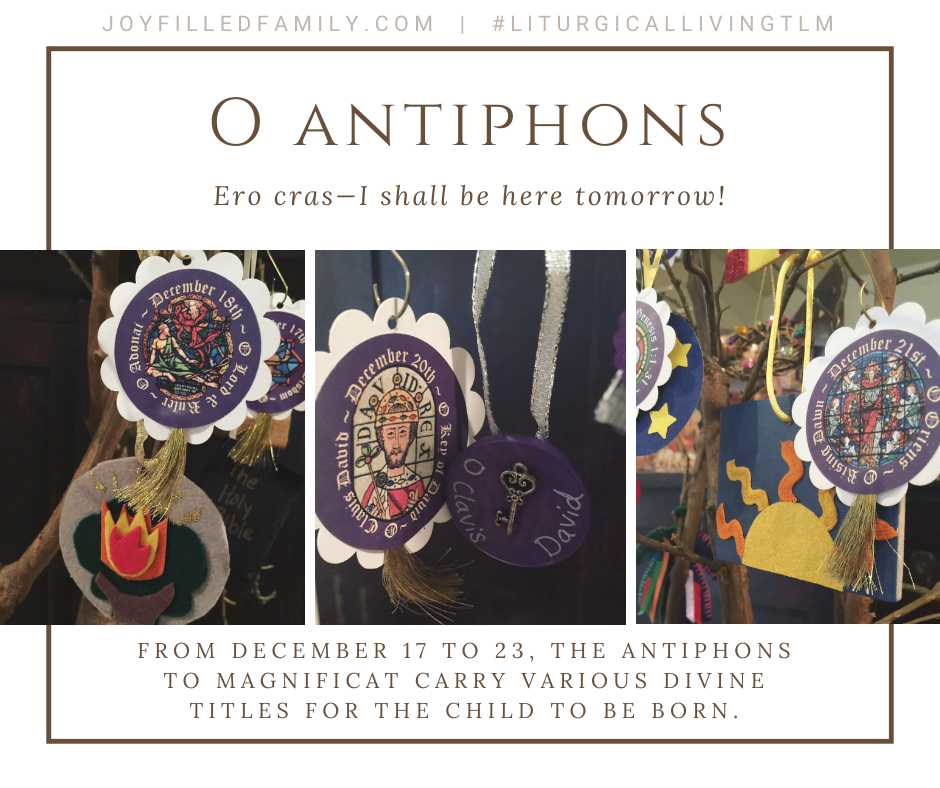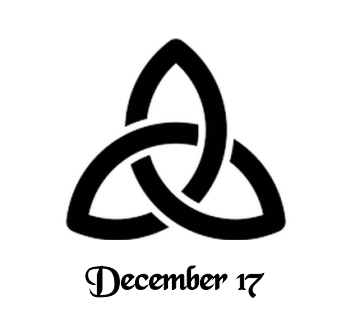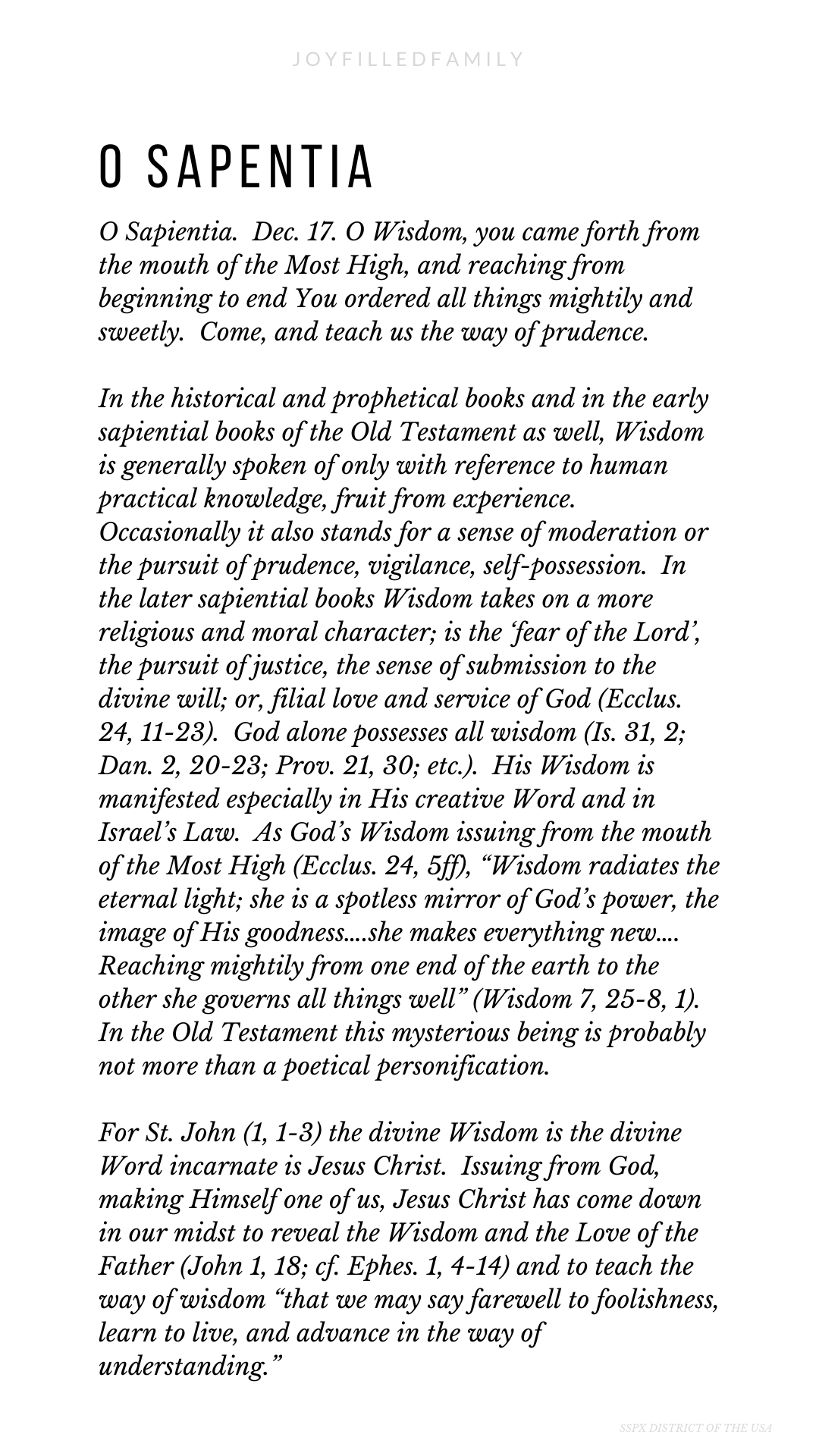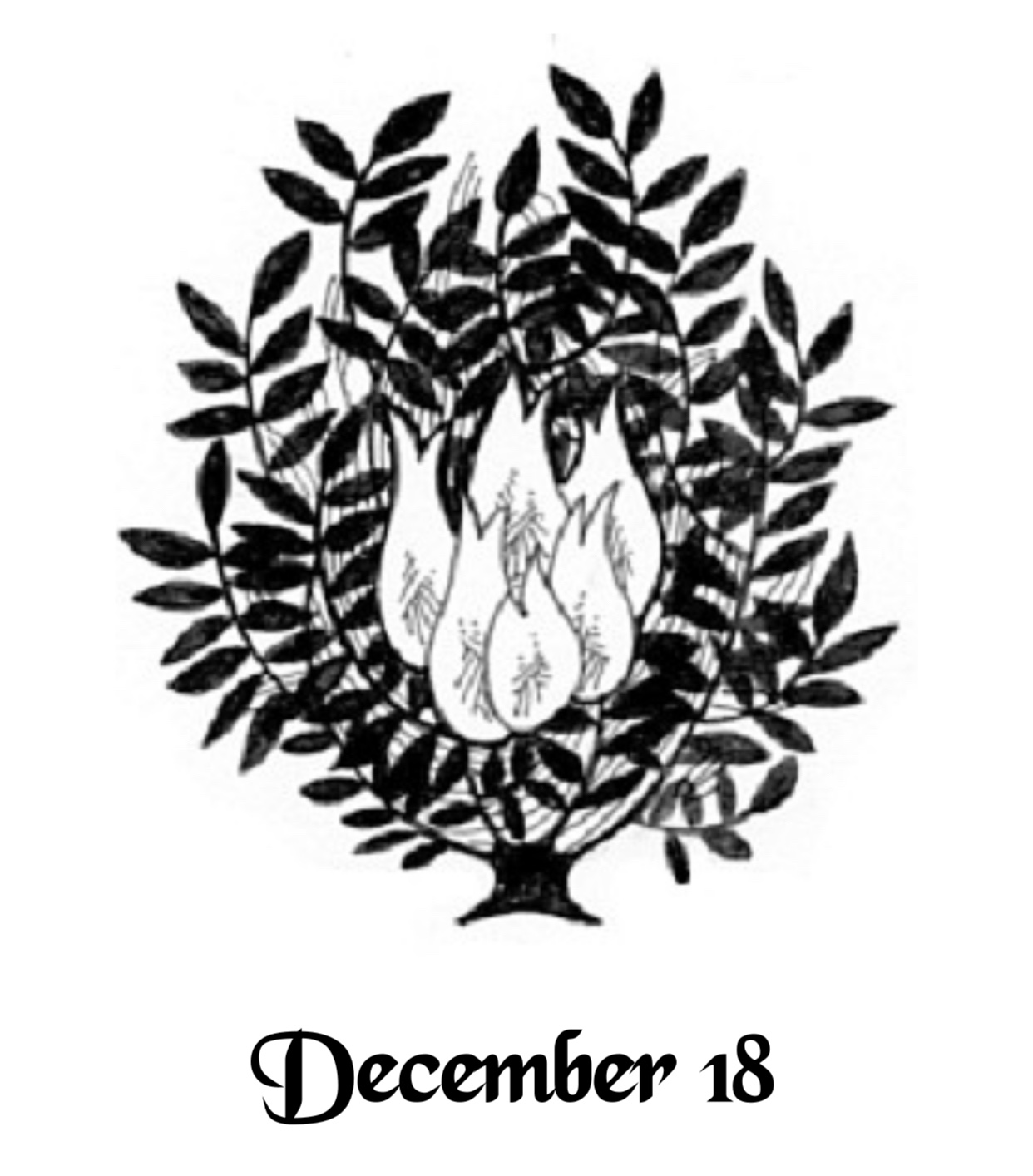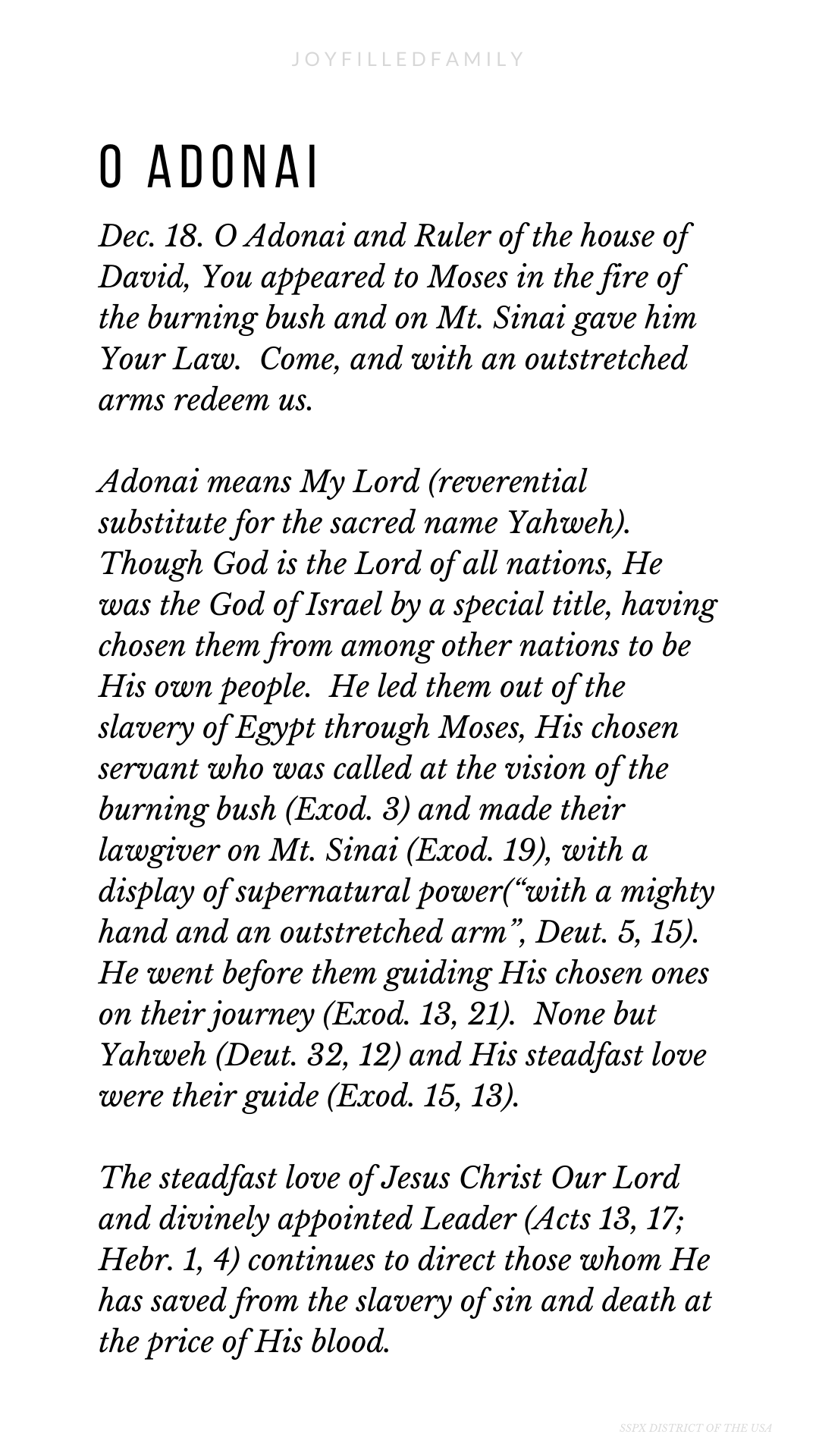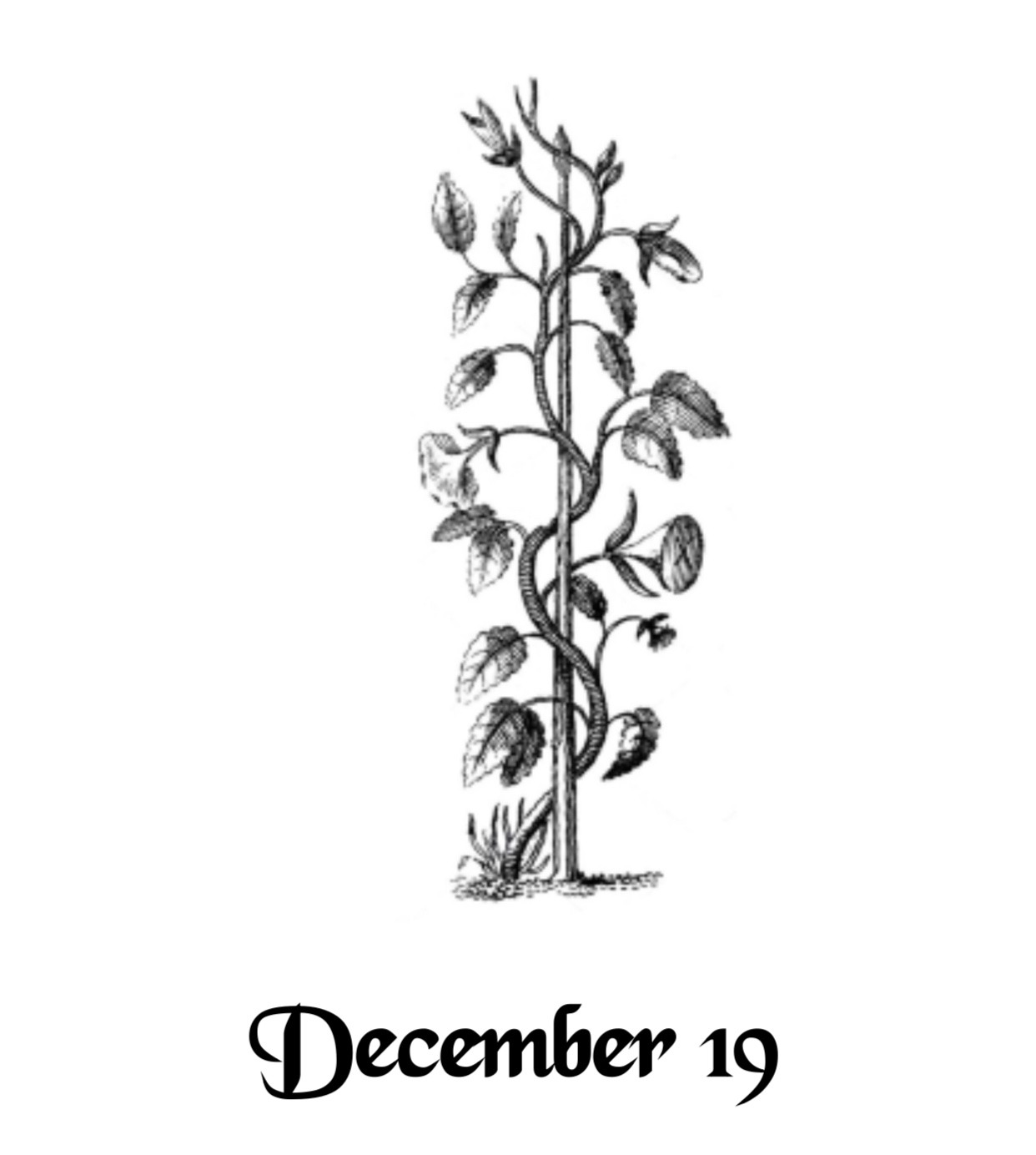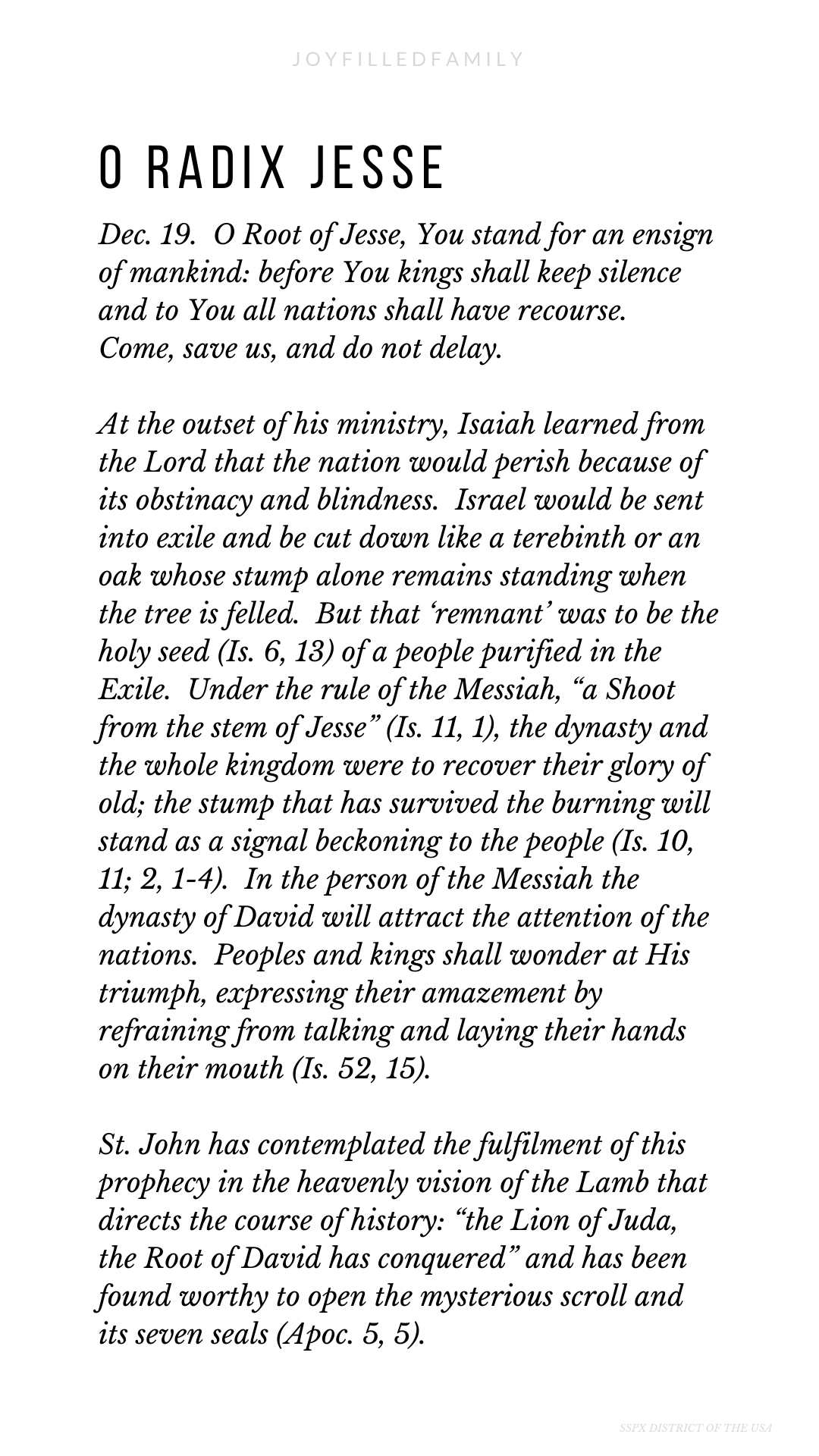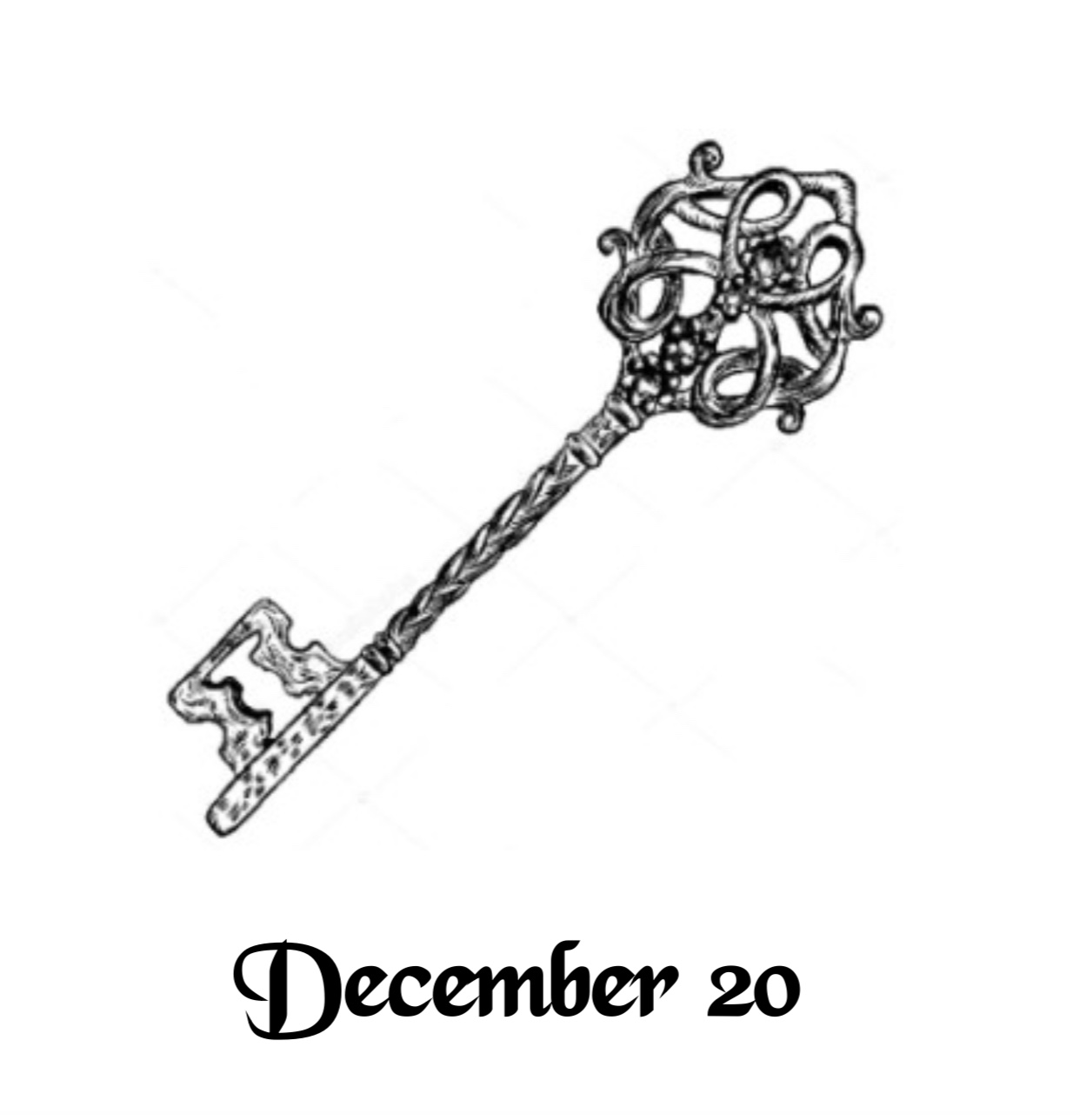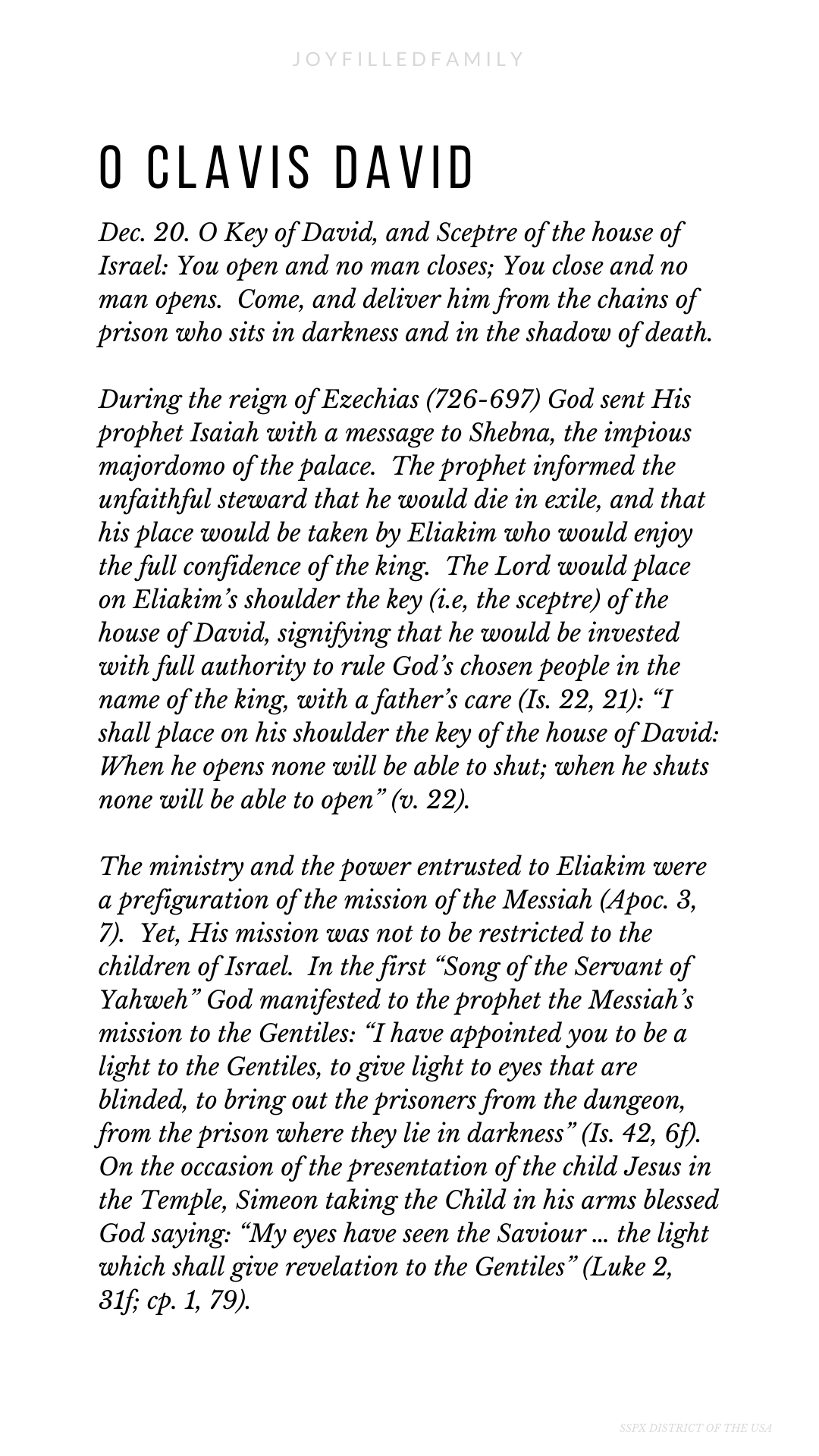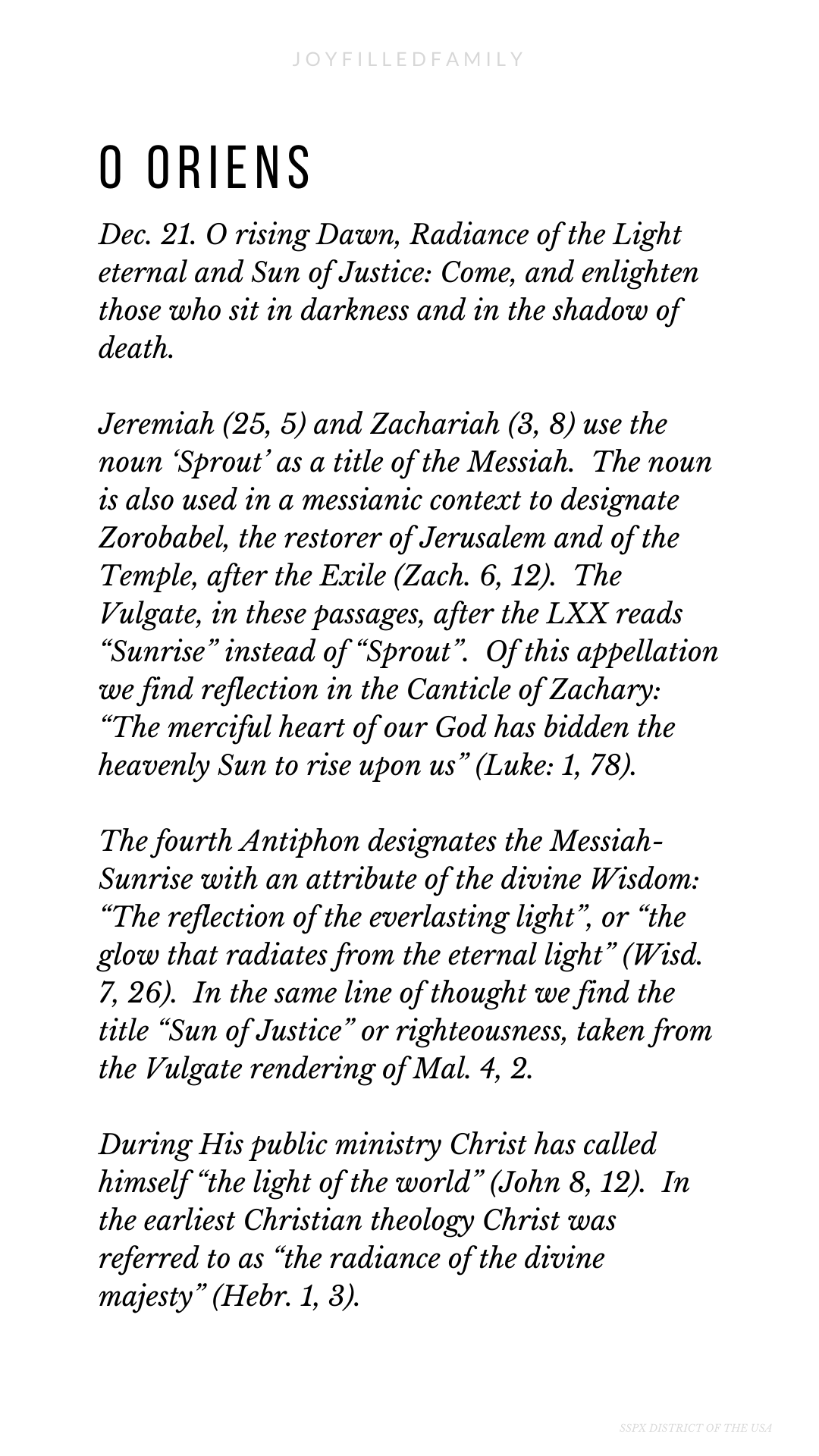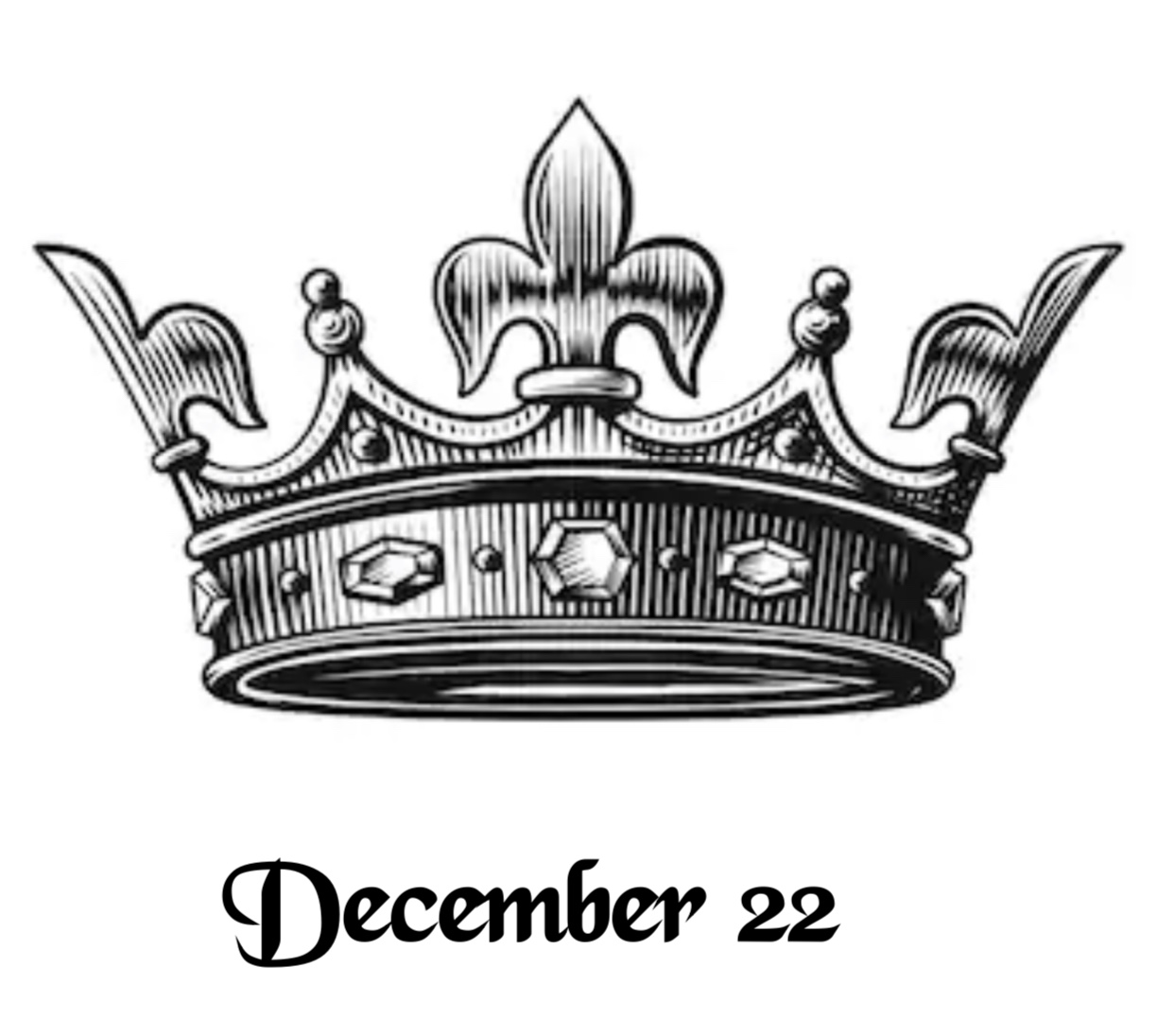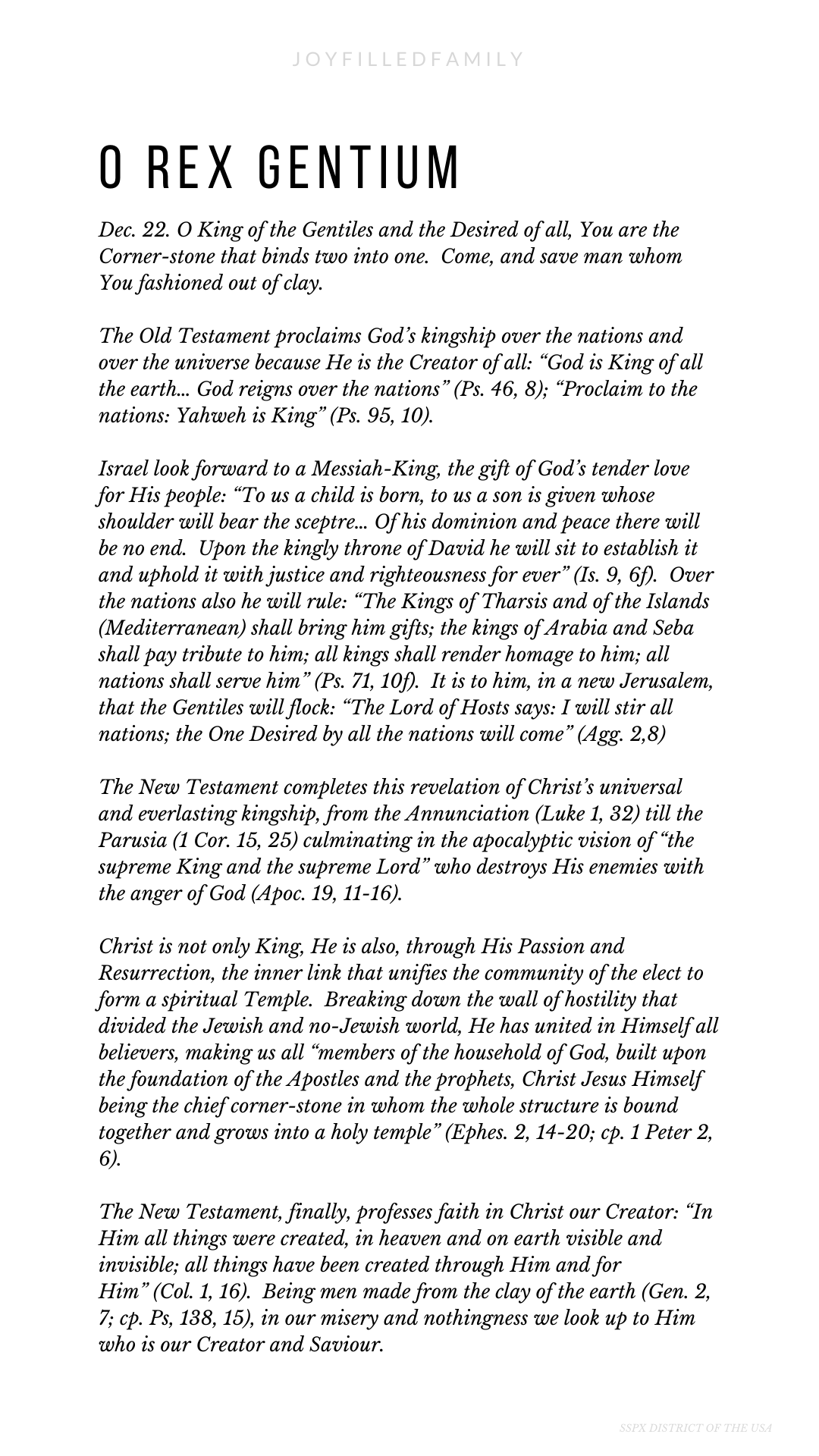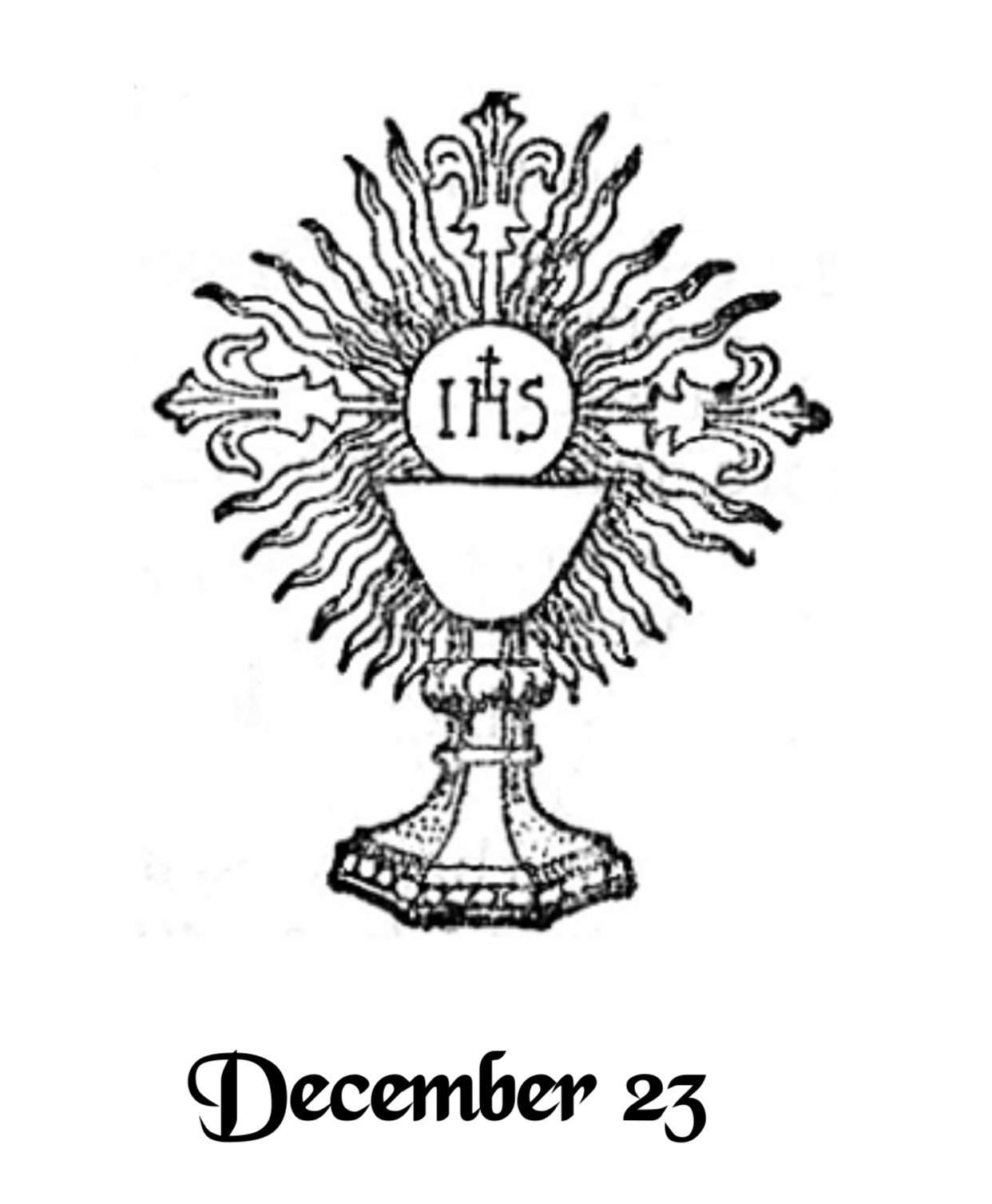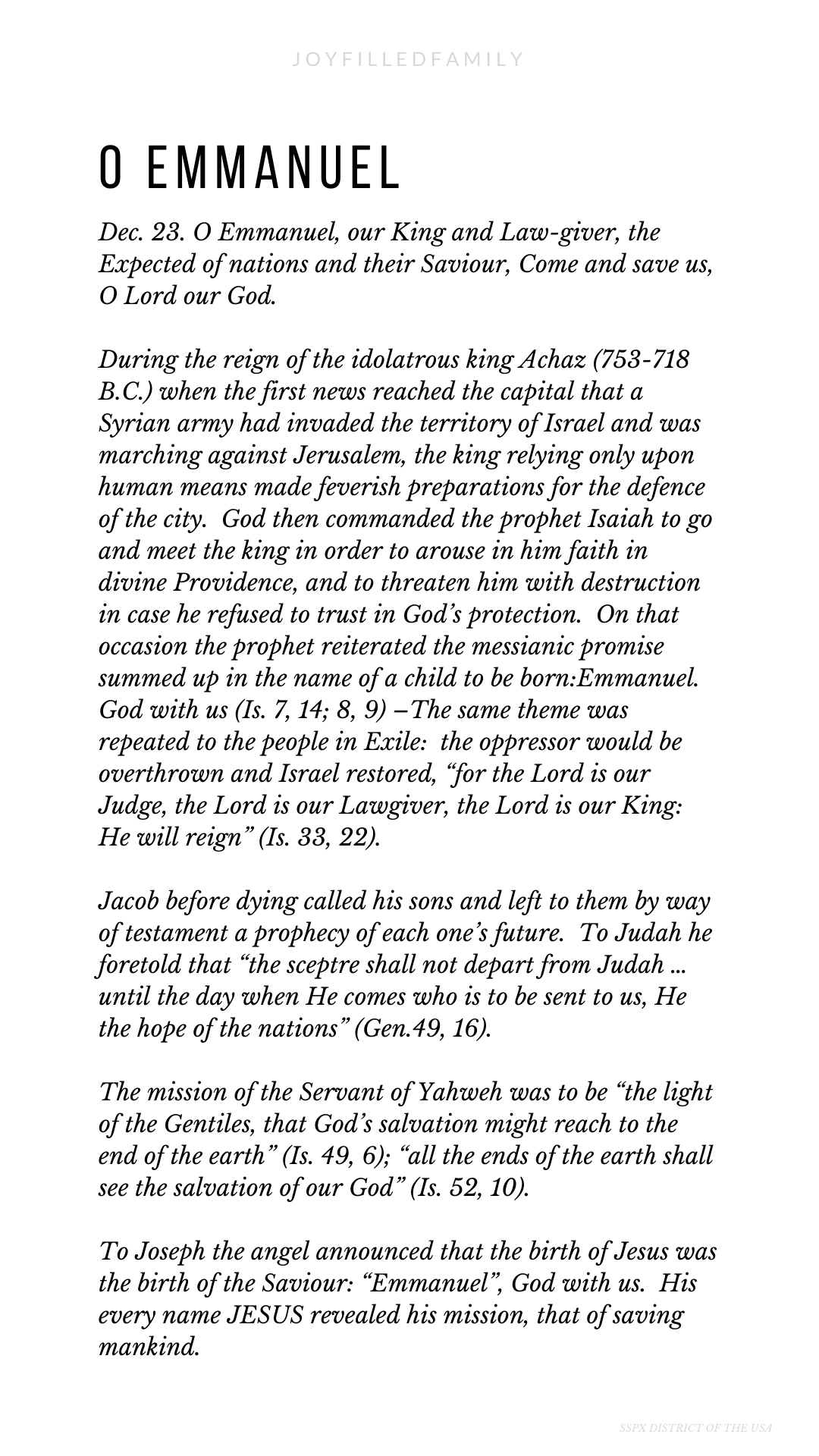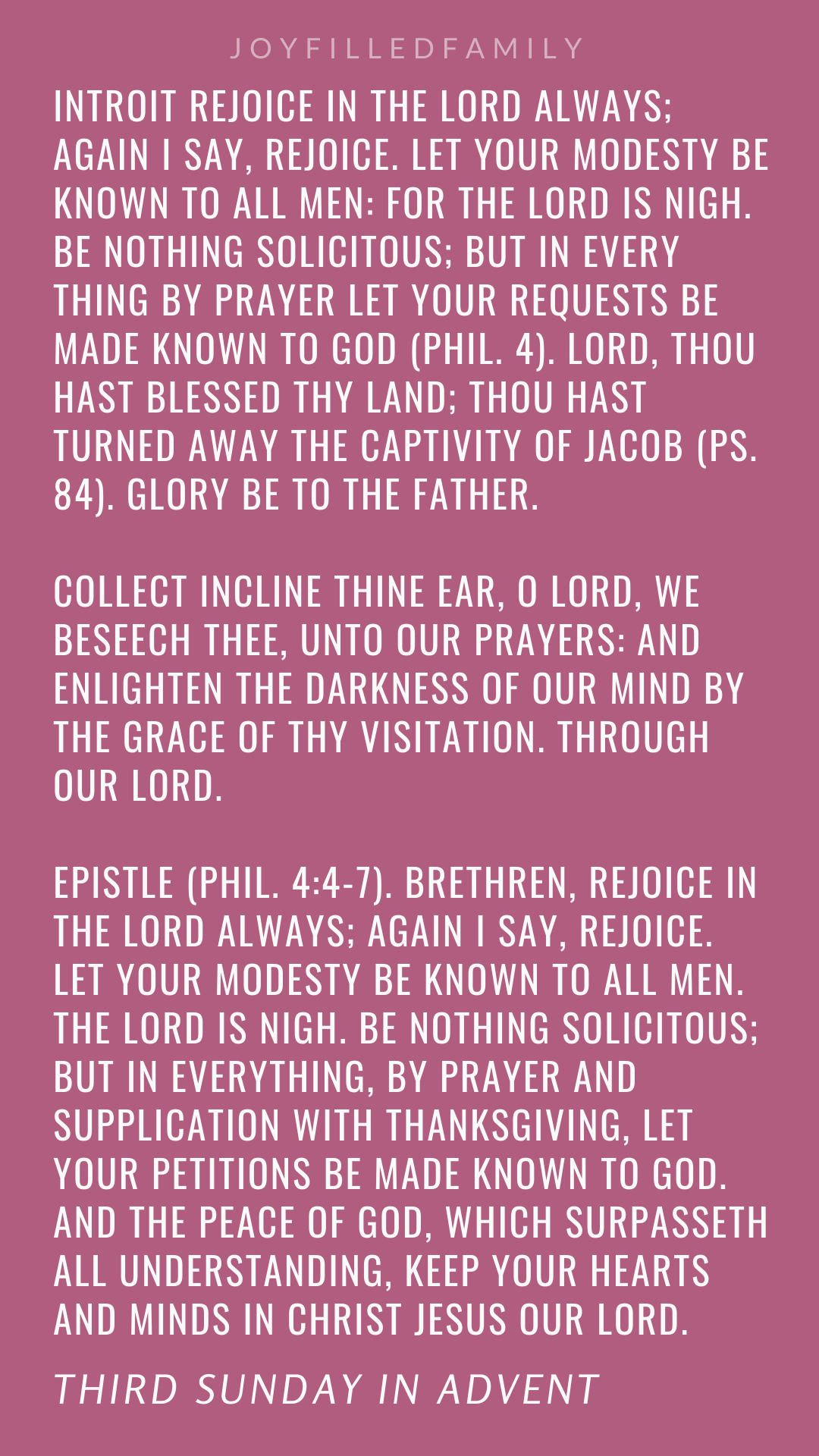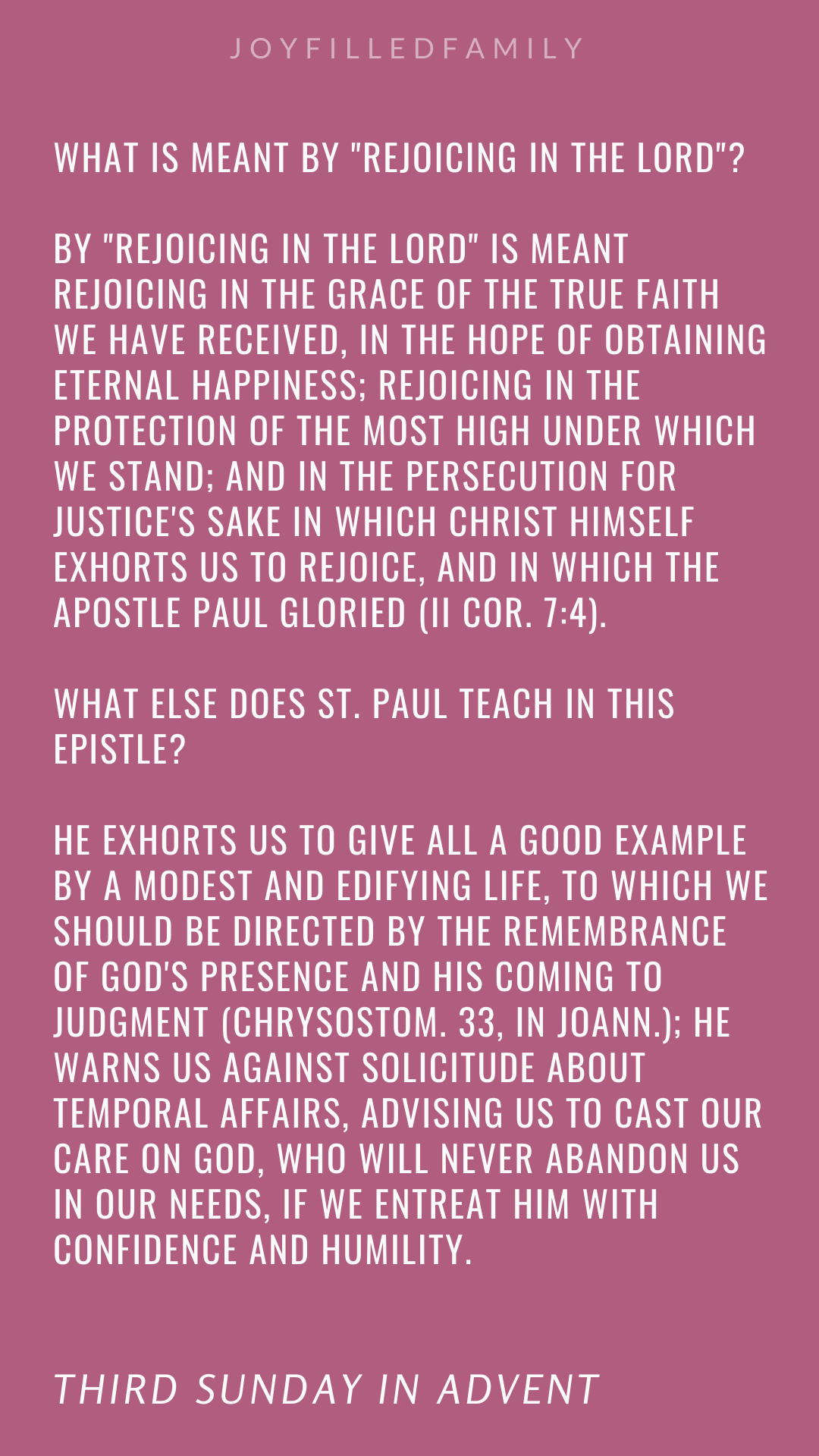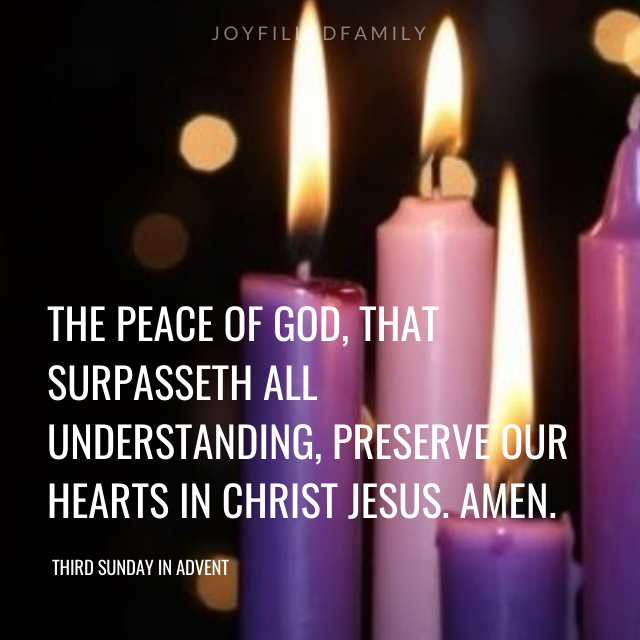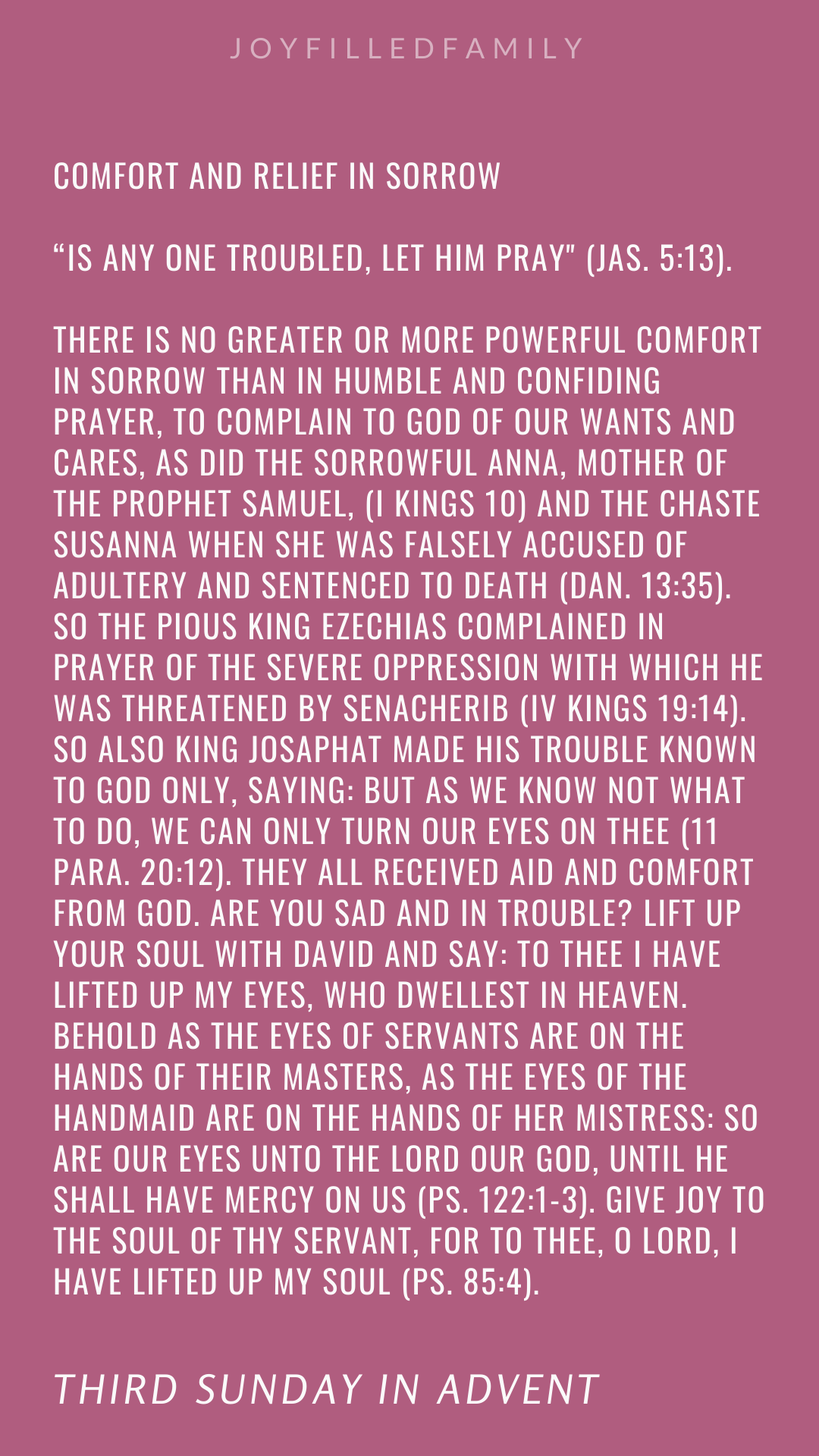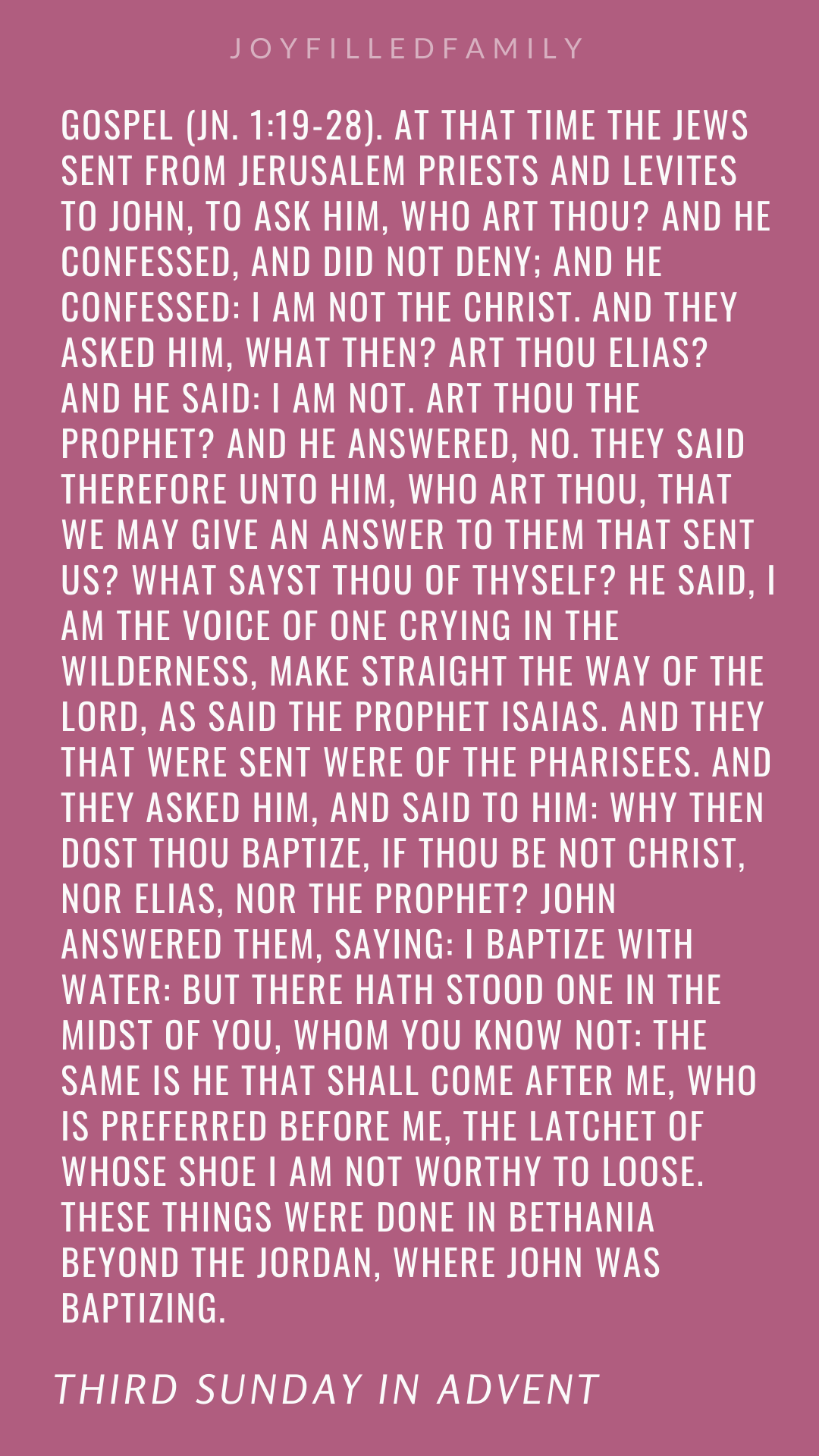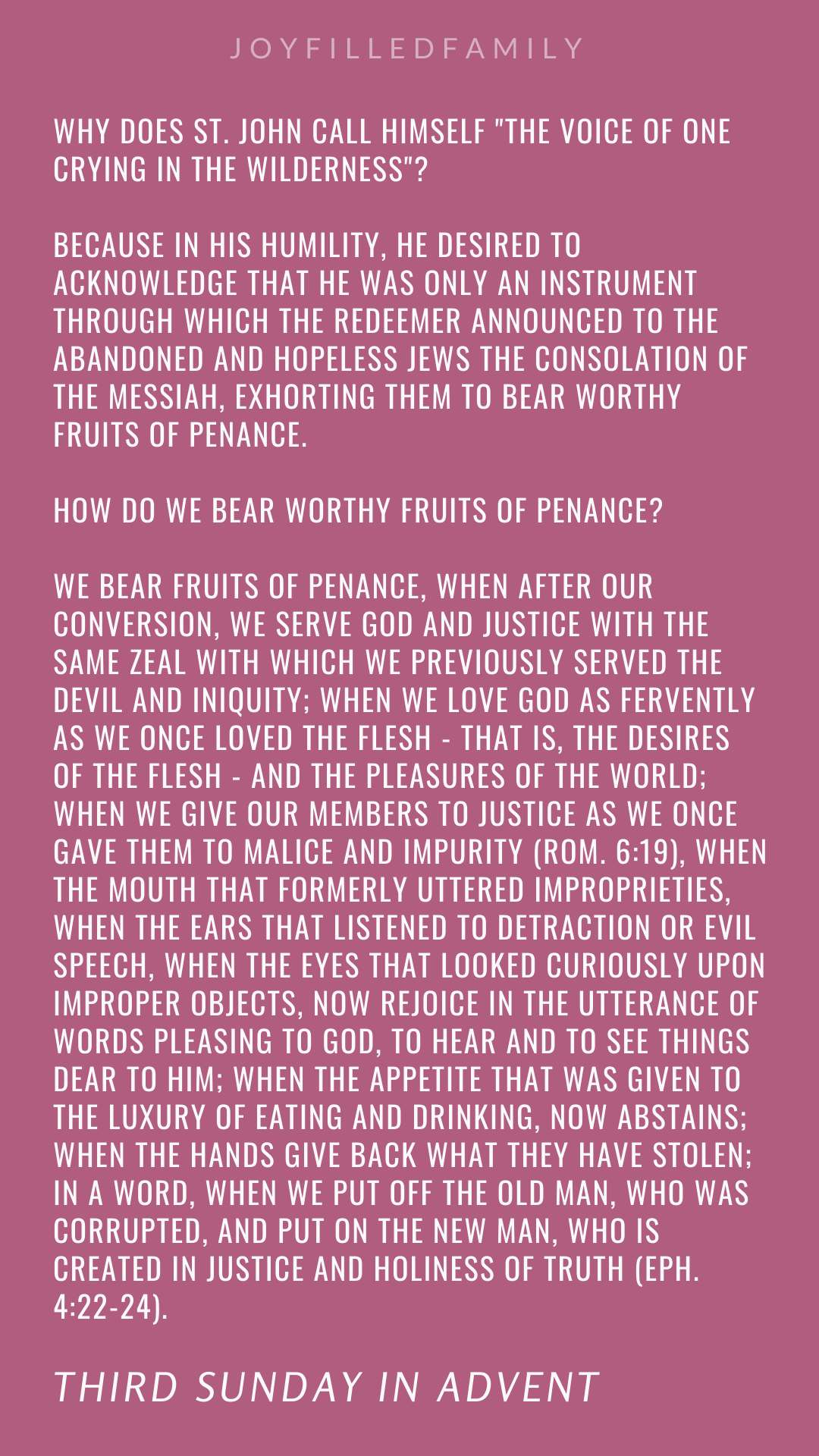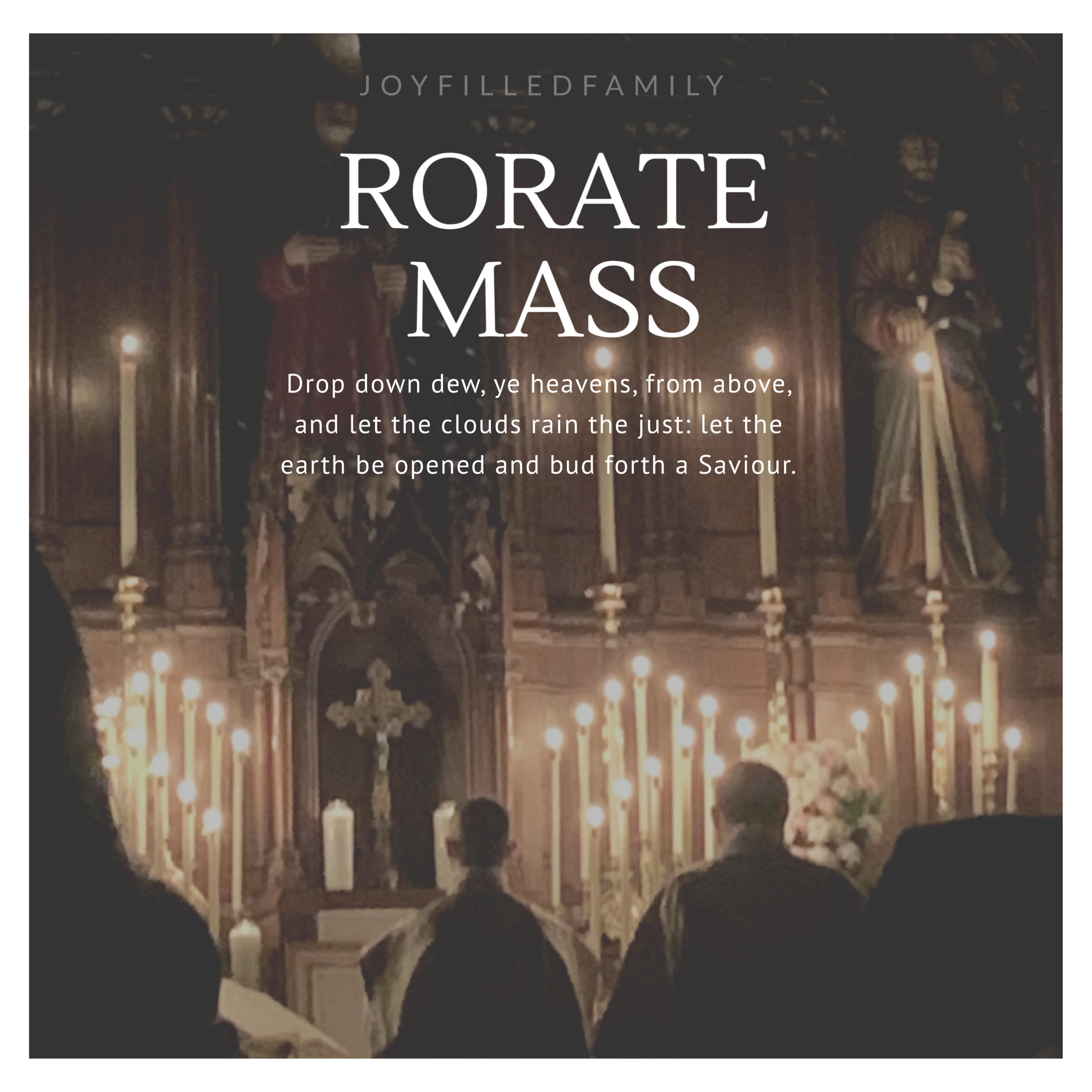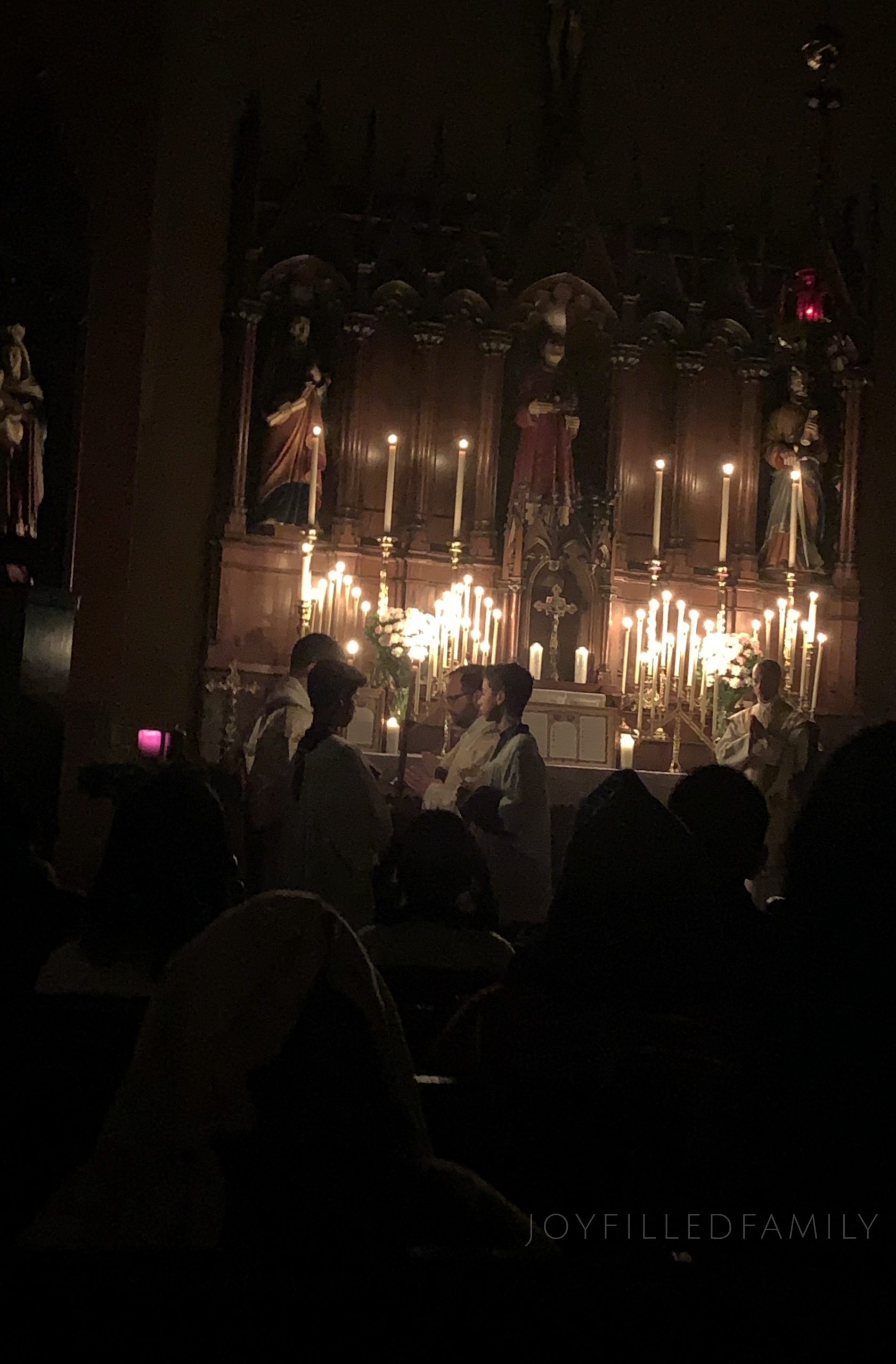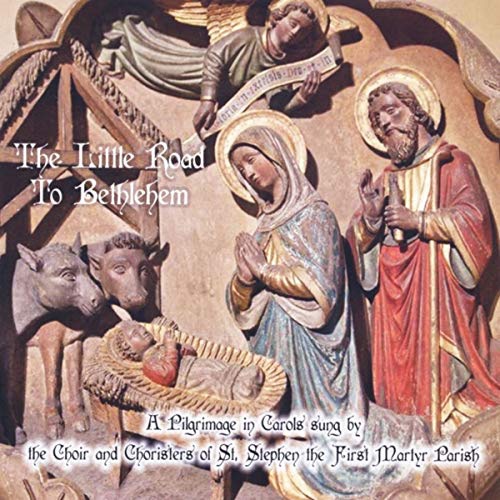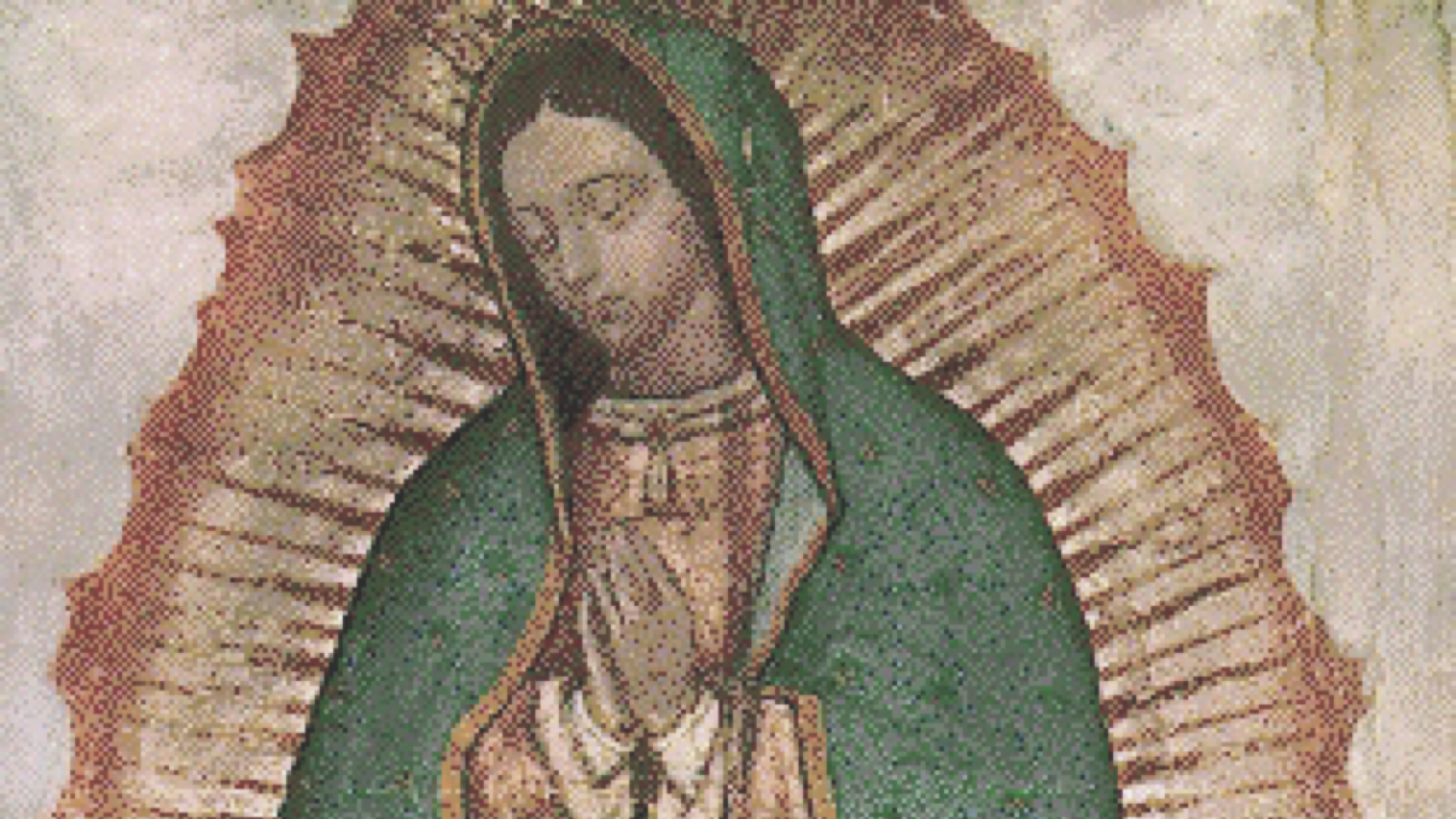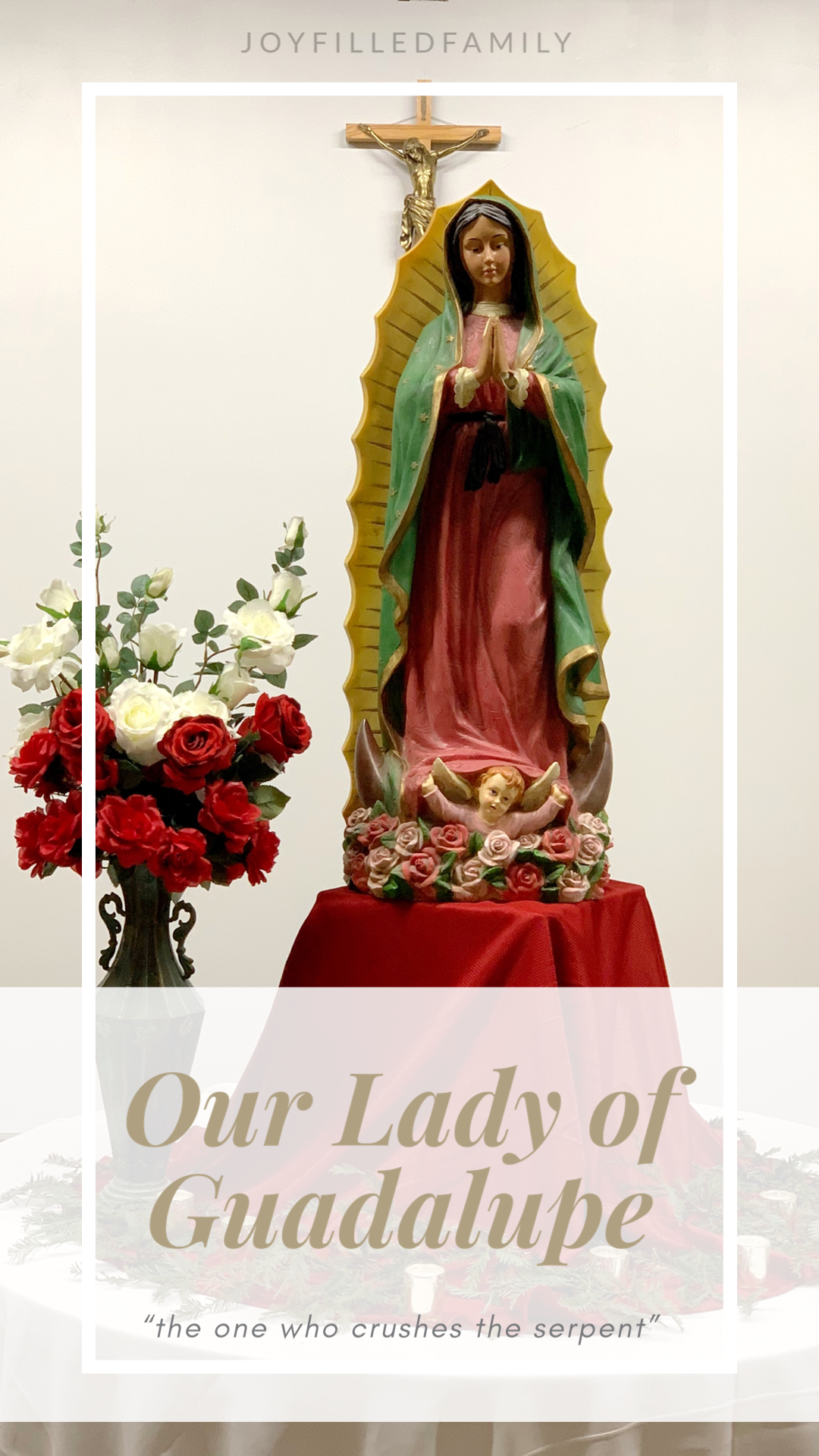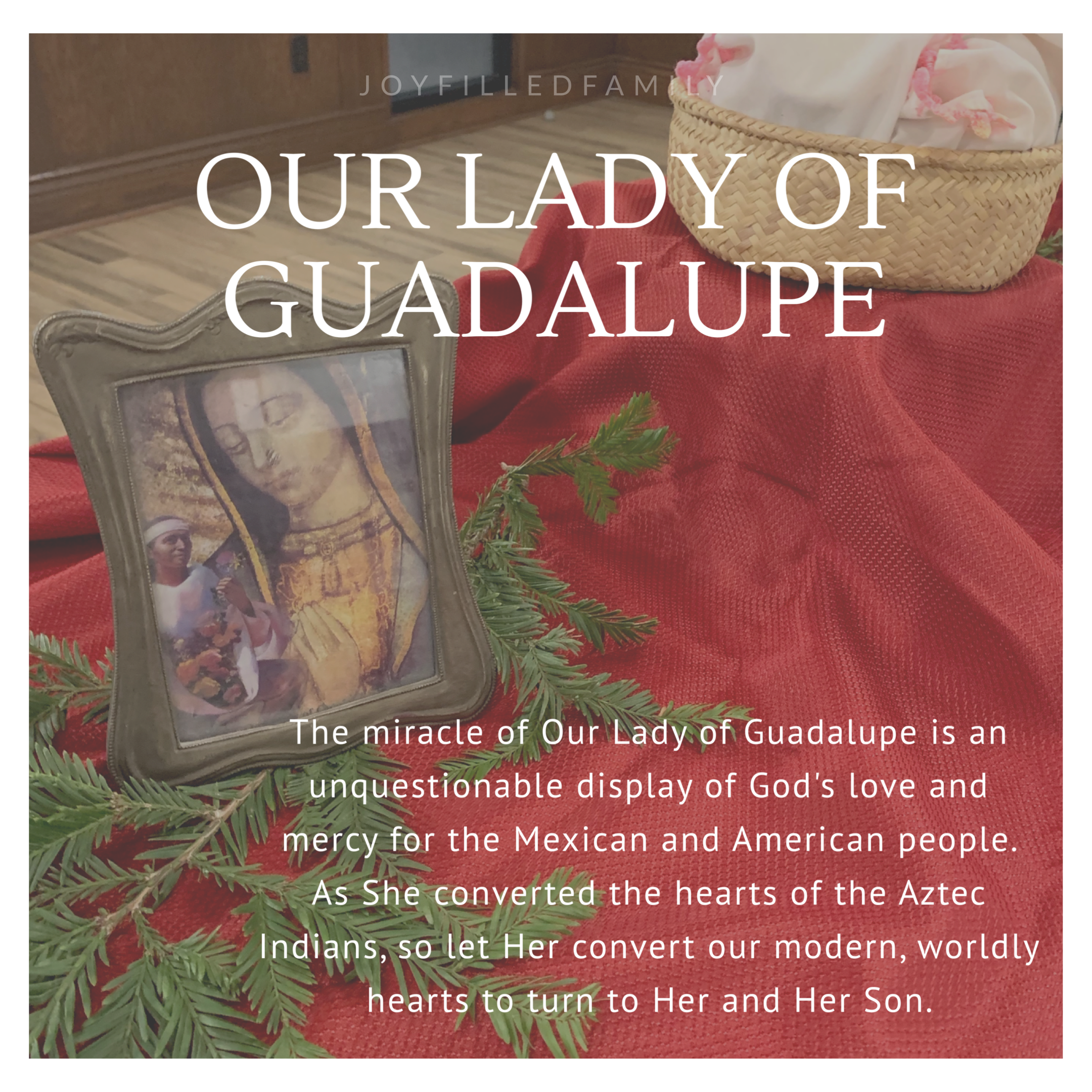Prepare Ye the Way of the Lord

FOURTH SUNDAY IN ADVENT
Fr. Goffine
On this Sunday the Church redoubles her ardent sighs for the coming of the Redeemer, and, in the Introit, places the longing of the just of the Old Law upon the lips of the faithful, again exhorting them through the gospel of the day, to true penance as the best preparation for the worthy reception of the Savior. Therefore at the Introit she prays:
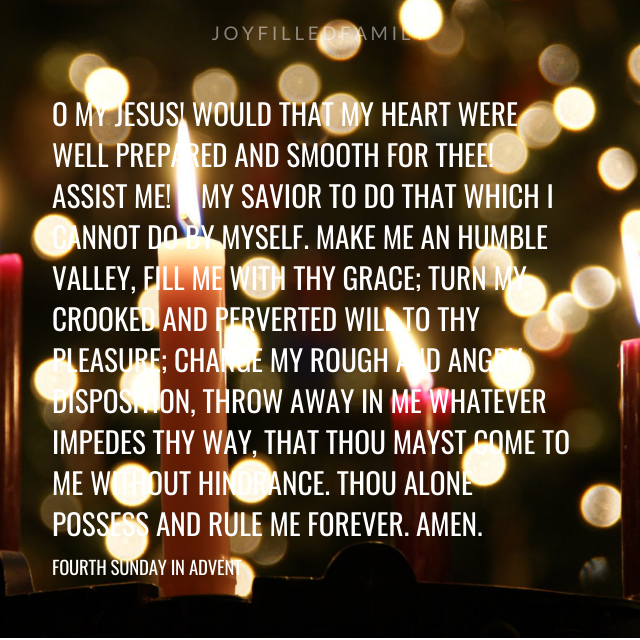
INTROIT Drop down dew, ye heavens, from above, and let the clouds rain the just (Is. 45). Let the earth be opened, and bud forth a Savior. The heavens show forth the glory of God, and the firmament declareth the work of his hands (Ps. 18:2). Glory be to the Father.
COLLECT Raise up, O Lord, we pray Thee, Thy power, and come, and with great might succor us: that, by the help of Thy grace, that which our sins impede may be hastened by Thy merciful forgiveness. Through our Lord.
EPISTLE (I Cor. 4:1-5). Brethren, Let a man so account of us as of the ministers of Christ, and the dispensers of the mysteries of God. Here now it is required among the dispensers, that a man be found faithful. But to me, it is a very small thing to be judged by you, or by man’s day: but neither do I judge my own self. For I am not conscious to myself of anything, yet am I not hereby justified: but he that judgeth me is the Lord. Therefore judge not before the time, until the Lord come: who both will bring to light the hidden things of darkness, and will make manifest the counsels of the hearts: and then shall every man have praise from God.
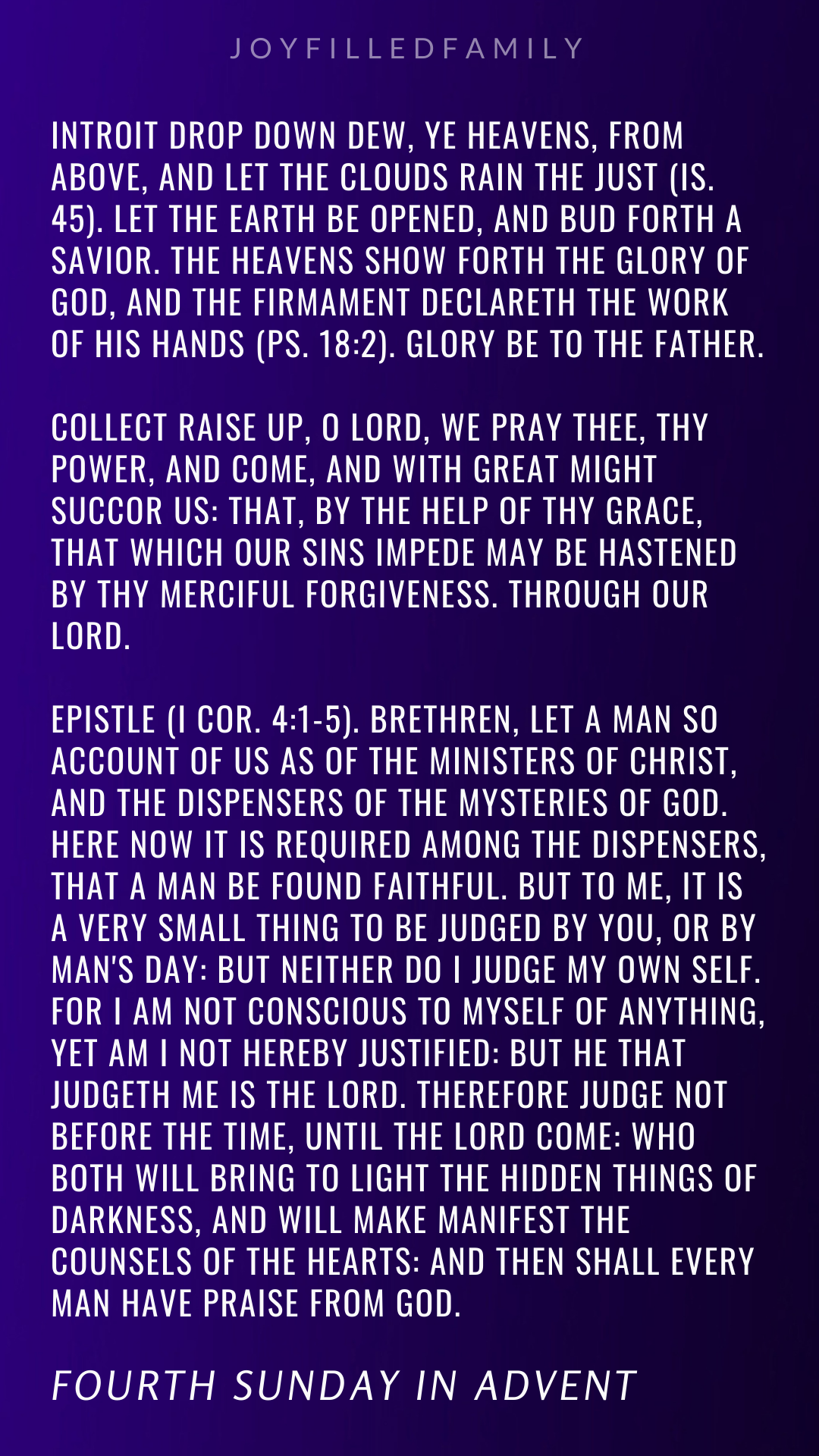
Why is this epistle read on this day?
The Church desires by this epistle to impress those who received Holy Orders on Ember Saturday with the dignity of their office, and exhorts them to fill it with becoming fidelity and sanctity, excelling the laity in piety and virtue, as well as in official dignity. She wishes again to remind the faithful of the terrible coming of Christ to judgment, urging them, by purifying their conscience through a contrite confession, to receive Christ at this holy Christmas time, as their Savior, that they may not behold Him, at the Last Day, as their severe judge.
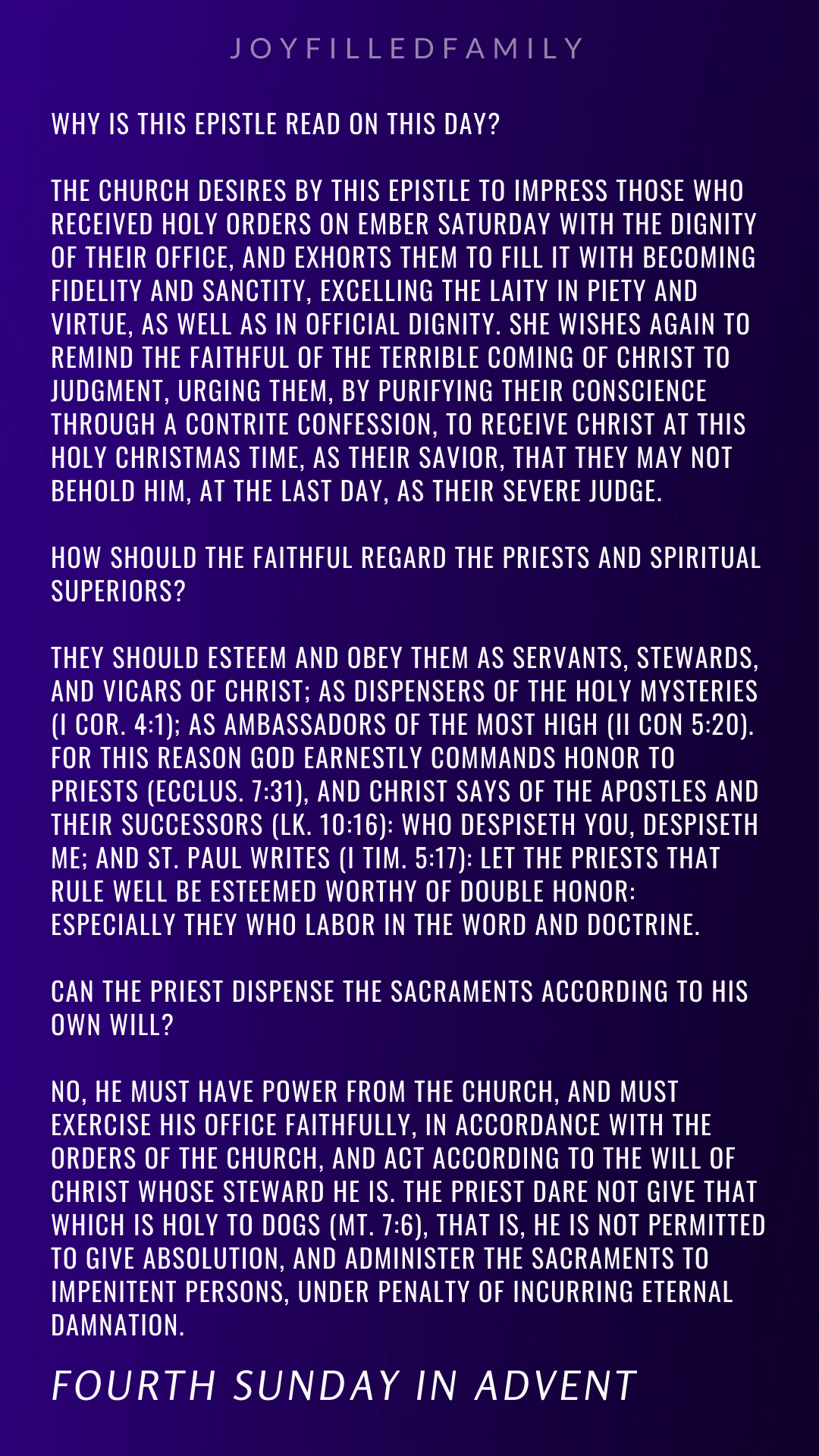
How should the faithful regard the priests and spiritual superiors?
They should esteem and obey them as servants, stewards, and vicars of Christ; as dispensers of the holy mysteries (I Cor. 4:1); as ambassadors of the most High (II Con 5:20). For this reason God earnestly commands honor to priests (Ecclus. 7:31), and Christ says of the Apostles and their successors (Lk. 10:16): Who despiseth you, despiseth me; and St. Paul writes (I Tim. 5:17): Let the priests that rule well be esteemed worthy of double honor: especially they who labor in the word and doctrine.
Can the priest dispense the sacraments according to his own will?
No, he must have power from the Church, and must exercise his office faithfully, in accordance with the orders of the Church, and act according to the will of Christ whose steward he is. The priest dare not give that which is holy to dogs (Mt. 7:6), that is, he is not permitted to give absolution, and administer the sacraments to impenitent persons, under penalty of incurring eternal damnation.
Why does St. Paul consider the judgment of men a small matter?
Because it is usually false, deceptive, foolish, and is consequently not worth seeking or caring for. Man often counts as evil that which is in itself good and, on the contrary, esteems as good that which is evil. St. Paul says: If I yet pleased men, I should not be the servant of Christ (Gal. 1:10). Oh, how foolish, and what poor Christians, therefore, are they, who not to displease man, willingly adopt all silly customs, and fashions in dress, manners and appearance, making themselves contemptible to God, the angels, and saints. Recall the beautiful words of the Seraphic St. Francis: “We are, what we are in the sight of God, nothing more”; learn from them to fulfil your duties faithfully, and be indifferent to the judgment of the world and its praise.
Why does not St. Paul wish to judge himself?
Because no one, without a special revelation from heaven, can know if he be just in the sight of God or not, even though his conscience may accuse him of nothing, for “man knoweth not whether he be worthy of love or hatred” (Eccles. 9:1). Thus St. Paul goes on to say, that though he was not conscious of any wrong, he did not judge himself to be justified, God only could decide that. Man should certainly examine himself as much as is in his power, to find if he has anything within him displeasing to God; should he find nothing he must not judge himself more just than others, but consider that the eyes of his mind may be dimmed, and fail to see that which God sees and will reveal to others at the judgment Day. The Pharisees saw no fault in themselves, and were saintly and perfect in their own estimation, yet our Lord cursed them.
ASPIRATION “O Lord, enter not into judgment with Thy servant: for in Thy sight no man living can be justified” (Ps. 142:2).
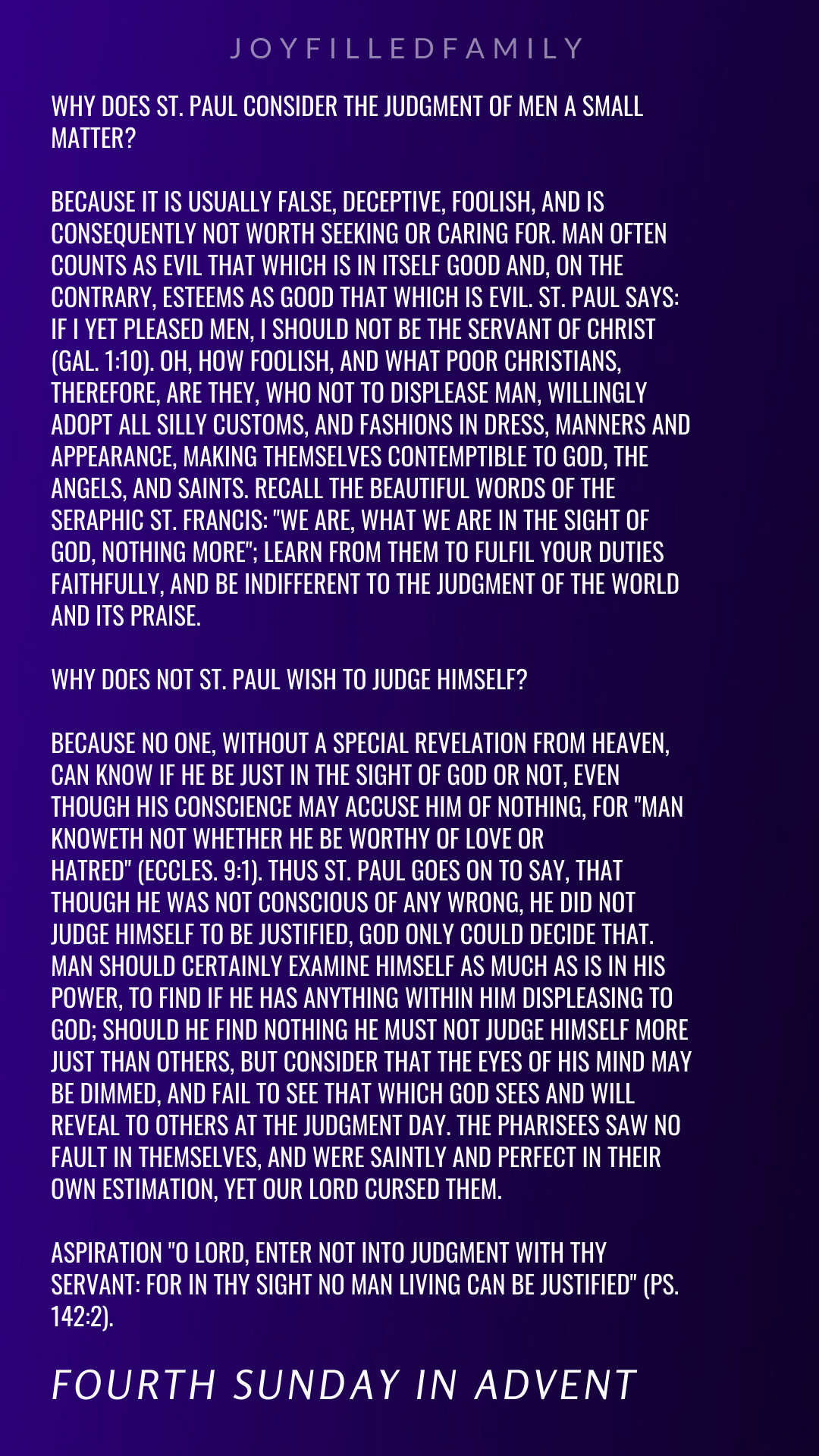
GOSPEL (Lk. 3:1-6). In the fifteenth year of the reign of Tiberius Caesar, Pontius Pilate being governor of Judea, and Herod being tetrarch of Galilee, and Philip his brother tetrarch of Iturea and the country of Trachonitis, and Lysanias tetrarch of Abilina, under the high priests Annas and Caiphas: the word of the Lord came to John the son of Zachary in the desert. And he came into all the country about the Jordan, preaching the baptism of penance for the remission of sins, as it is written in the book of the sayings of Isaias the prophet: A voice of one crying in the wilderness: Prepare ye the way of the Lord, make his paths straight. Every valley shall be filled, and every mountain and hill shall be brought low: the crooked shall be made straight, and the rough ways plain: and all flesh shall see the salvation of God.
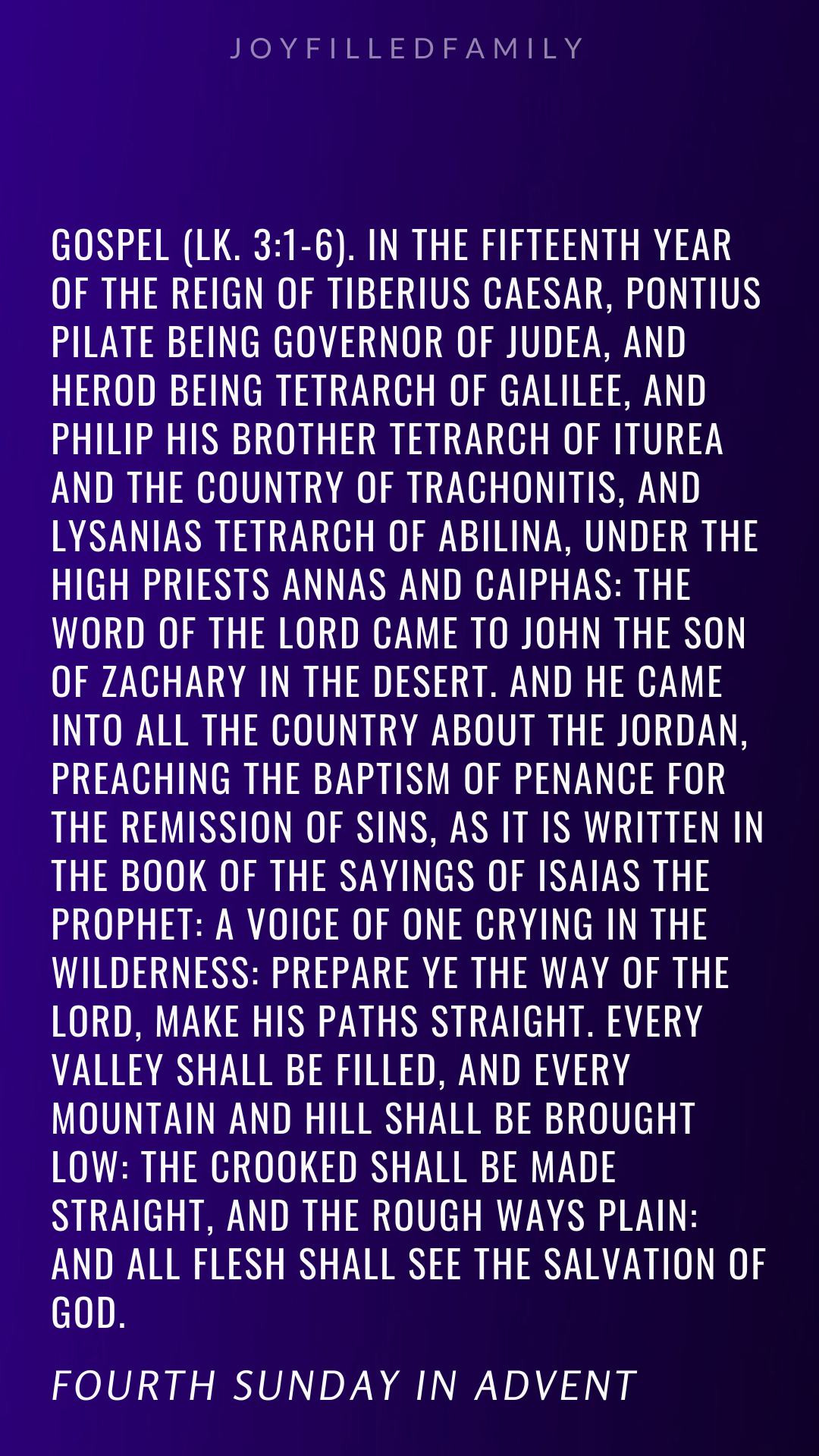
Why is the time in which St. John commenced to preach so minutely described?
The Evangelist, contrary to his usual custom, describes the time minutely, and enumerates exactly, in their precise order, the religious and civil princes in office, that, in the first place, it could not be denied that this was truly the time and the year in which the promised Messiah appeared in this world, whom John baptized, and the Heavenly Father declared to be His beloved Son. Furthermore, it shows the fulfillment of the prophecy of the Patriarch Jacob (Gen. 49:10), that when the scepter would be taken away from Juda, that is, when the Jews would have no longer a king from their own tribes, the Savior would come.
What is meant by: “The word of the Lord came to John”?
It means that John was commissioned by divine inspiration, or by an angel sent from God, to preach penance and announce to the world the coming of the Lord. He had prepared himself for this work by a penitential, secluded life, and intercourse with God. We learn from his example not to intrude ourselves into office, least of all into a spiritual office, but to await the call from God, preparing ourselves in solitude and quiet, by fervent prayer and by a holy life, for the necessary light.
What is meant by: “Prepare ye the way of the Lord, make straight his paths”?
It means that we should prepare our hearts for the worthy reception of Christ, by penance, amendment, and the resolution to lead a pious life in future. To do this, every valley should be filled, that is, all faintheartedness, sloth and cowardice, all worldly carnal sentiments should be elevated and directed to God, the highest Good, by firm confidence and ardent desire for heavenly virtues; the mountains and hills should be brought low, that is, pride, stubbornness, and ambition should be humbled, and the obstinate will be broken. The crooked shall be made straight, that is, ill-gotten goods should be restored, hypocrisy, malice, and double dealing be renounced, and our intentions turned to God and the performance of His holy will. And the rough ways shall be made plain, that is, anger, revenge, and impatience must leave the heart, if the Lamb of God is to dwell therein. It may also signify that the Savior put to shame the pride of the world, and its false wisdom by building His Church upon the Apostles, who, by reason of their poverty and simplicity, may be considered the low valleys, while the way to heaven, formerly so rough and hard to tread, because of the want of grace, is now by His grace made smooth and easy.
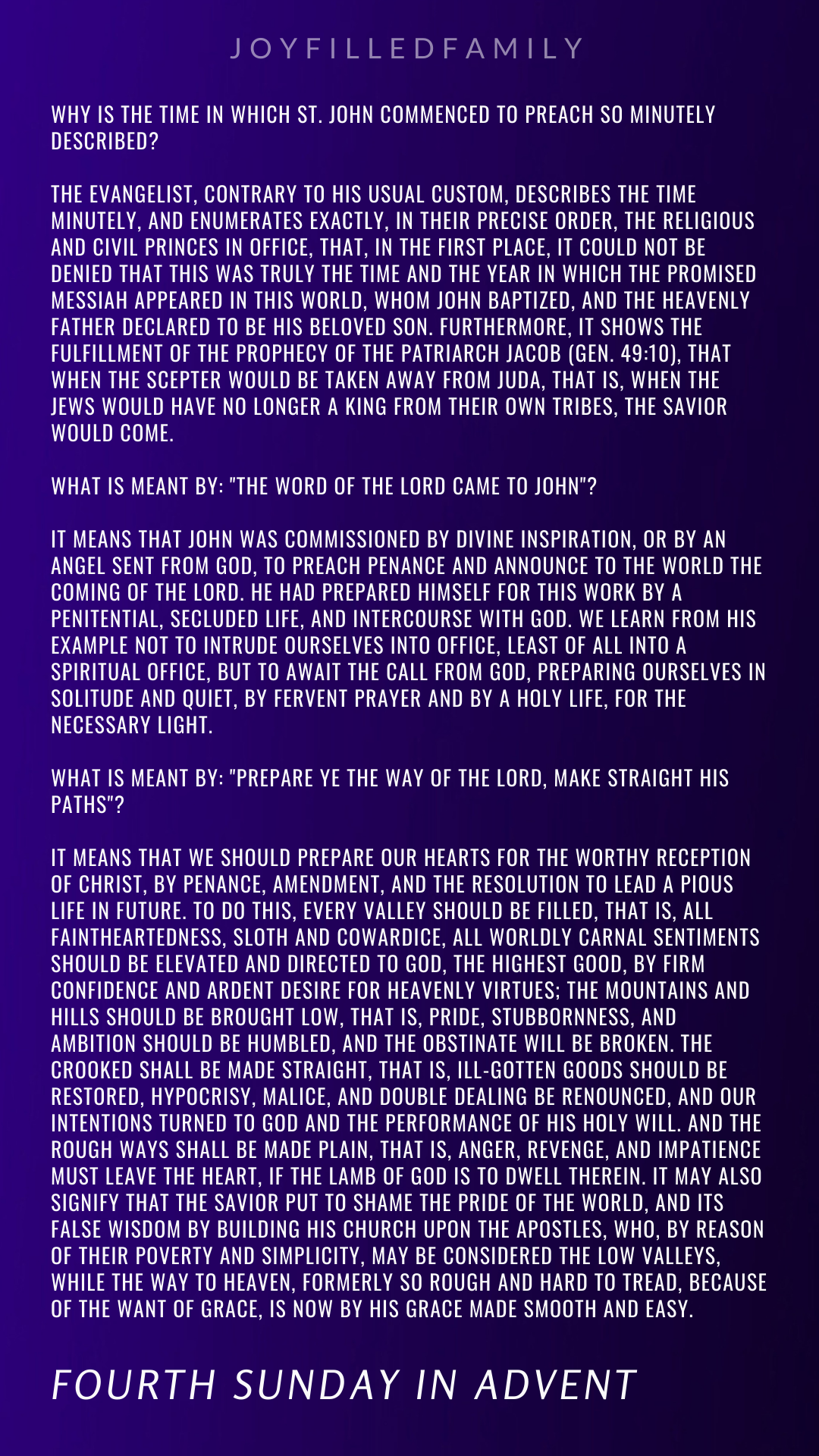
ASPIRATION O my Jesus! would that my heart were well prepared and smooth for Thee! Assist me! O my Savior to do that which I cannot do by myself. Make me an humble valley, fill me with Thy grace; turn my crooked and perverted will to Thy pleasure; change my rough and angry disposition, throw away in me whatever impedes Thy way, that Thou mayst come to me without hindrance. Thou alone possess and rule me forever. Amen.

INSTRUCTION ON THE HOLY SACRAMENT OF PENANCE
“Preaching the baptism of penance for the remission of sins”(Lk. 3:3).
What is penance, and how many kinds are there?
Penance, says the Roman Catechism (Cat. Rom. de Pcenit. 54), consists in the turning of our whole soul to God, hating and detesting the crimes we have committed, firmly resolving to amend our lives, its evil habits and corrupt ways, hoping through the mercy of God to obtain pardon. This is interior penance, or the virtue of penance. The sincere acknowledgment of our sins to a priest and the absolution he accords, is exterior penance, or the holy Sacrament of Penance, which Christ instituted (Jn. 20:22-23), through which the sins committed after baptism, are remitted.
Which of these penances is necessary for the forgiveness of sins?
Both are necessary, for unless the conversion of the heart to God, a true consciousness of, and sorrow for sin, the firm purpose of amendment and confidence in God’s mercy, precede the confession, declaring all our sins to a priest cannot obtain forgiveness of mortal sin committed after baptism. At the same time a really contrite turning to God, will not, without confession to a priest, obtain forgiveness, except when by circumstances, a person is prevented from approaching the tribunal of penance. Such a person must, however, have the ardent desire to confess as soon as possible.
Can any one who has committed mortal sin be saved without penance?
No, for penance is as necessary to such a one as baptism, if he wishes not to perish: Unless you do penance, says Christ, you shall all likewise perish (Lk. 13:3, 5).
Is this penance performed at once?
This penance is necessary every day of our lives: that is, we must from day to day endeavor to be heartily sorry for our sins, to despise them, to eradicate the roots of sin, that is, our passions and evil inclinations, and become more pleasing to God by penance and good works.
Why do so many die impenitent?
Because they do not accept and use the many graces God offers them, but put off their repentance. If such sinners, like the godless King Antiochus (II Mac. 9) intend to repent on their deathbed for fear of punishment, they usually find that God in His justice will no longer give them the grace of repentance, for he who when he can repent, will not, cannot when he will. “Who will not listen at the time of grace,” says St. Gregory, “will not be listened to’ in the time of anxiety.” And it is to be feared that he who postpones penance until old age, will not find justice where he looked for mercy.
Can all sinners do penance?
With the grace of God all can, even the greatest sinners; as a real father God calls them when He says: As I live …I desire not the death of the wicked, but that the wicked turn from his way, and live. Turn ye, turn ye from your evil ways: and why will ye die, O house of Israel? And the wickedness of the wicked shall not hurt him, in what day soever he shall turn from his wickedness (Ezech. 33:11-12).
Do all who go to confession perform true penance?
Unfortunately they do not; for all is not accomplished with confession. If there is no sincere detestation of sin, no true sorrow for having offended God; if the evil inclinations and bad habits are not overcome, ill-gotten goods restored, and calumny repaired, the occasions of sin avoided; if a sincere amendment of life, or, at least, its earnest purpose does not follow, then indeed, there cannot be the least shadow of true repentance, not even though such persons confess weekly. But alas! we see many such. And why? Because many think repentance consists simply in confession, and not in the amendment of their lives. Only those obtain pardon who are truly penitent, and perform all that is enjoined upon them in confession. It is well, therefore, to read and carefully act according to the following instructions.
I. ON THE EXAMINATION OF CONSCIENCE
The foundation of true repentance, interior and exterior (see the preceding pages), is the vivid knowledge of our sins. There are many who are unconscious of the most grievous sins in which they are buried; blinded by self-love they do not even regard them as sins, do not confess them, perform no penance for them and are consequently eternally lost. To prevent this great evil, the Council of Trent (Sess. XIV c.5) ordered a careful examination of conscience before confession, and afterwards to confess the sins which are discovered by that examination.
Why should we examine our conscience?
Because, as St. Ignatius says, no one can become fully aware of his own faults, unless God reveals them by a special light; we should, therefore, first of all, daily ask the Holy Ghost to enlighten us, and should then examine our thoughts, desires, words, actions, and omissions since our last valid confession and how often we have sinned in these respects. To know this, we should let our conscience, that is, the inner voice which tells us what is good and what is evil, speak freely, without flattering ourselves, or passing it by negligently. St. Charles Borromeo says, we should place before our eyes the Ten Commandments of God and carefully compare our life and our morals with them; it is well also to examine ourselves on the seven deadly sins, and remember the places and persons with whom we have been in contact, the duties of our state of life, the vices to which we are most inclined, the consequences that were, or might have been produced upon ourselves or others. At the same time, we should imagine ourselves standing before the judgment seat of God, and whatever would cause us fear there, whatever we could not answer for there, we should look upon as sins, be sorry for, and confess.
Is it a sin not to examine ourselves long and carefully?
Certainly it is a sin for those to examine their consciences carelessly, who live unfaithfully and in mortal sin, and who seldom confess, because they expose themselves frivolously to the danger of leaving out great sins, and consequently they make a sacrilegious confession, committing thereby a new and grievous sin.
Those who daily ask God for enlightenment and examine their conscience at least every evening before going to bed, will prepare themselves properly before approaching the tribunal of penance. “Behold, you have a book in which you write your daily expenses,” says St. Chrysostom, “make a book of your conscience, also, and write there your daily sins. Before you go to bed, before sleep comes, take your book, that is, your conscience, and recall your sins, whether of thought, word, or deed. Say then to your soul: Again, O my soul, a day is spent, what have we done of evil or of good? If you have accomplished some good, be grateful to God; if evil, resolve to avoid it for the future. Shed tears in remembrance of your sins; ask forgiveness of God, and then let your body sleep.”
II. ON CONTRITION
“O man,” cries St. Augustine, “why dost thou weep over the body whence the soul has departed, and not over the soul from which God has withdrawn?” The idolatrous Michas (Judg. 18:23-24) complained bitterly, because his idols were taken from him; Esau grieved greatly over the loss of his birthright and his father’s blessing (Gen. 27:34). Should we not therefore, be filled with sorrow, when by our sins we have lost God and Heaven?
What is contrition, and how many kinds are there?
“Contrition is a hearty sorrow and detestation of our sins, with a firm purpose of sinning no more” (Conc. Trid., Sess. XIV, can. 4). If this grief and detestation comes from a temporal injury, shame or punishment, it is a natural sorrow; but if we are sorry for our sins, because by them we have offended God, and transgressed His holy law, it is a supernatural sorrow; this, again, is imperfect when fear of God’s punishment is the motive; it is perfect, if we are sorry for our sins, because we have offended God, the supreme Lord and best of Fathers.
Is natural sorrow sufficient for a good confession?
It is not, because it proceeds not from a supernatural motive, but from the love or fear of the world. A mere natural sorrow for our sins worketh death (II Cor. 7:10). If one confess his sins having only a natural sorrow for them, he commits a sacrilege, because the most necessary part of the Sacrament of Penance in wanting.
What other qualities are necessary for a true contrition?
Contrition should be interior, proceeding from the heart and not merely from the lips; it must be universal, that is, it must extend to all the mortal sins which the sinner has committed; it must be sovereign, that is, he must be more sorry for having offended God, than for any temporal evil; it must be supernatural, that is, produced in the heart by supernatural motives; namely, because we have offended God, lost His grace, deserved hell, etc.
What kind of sorrow must we have in order to obtain forgiveness of our sins?
That sorrow which proceeds from a perfect love of God, and not from fear of temporal or eternal punishment. This perfect contrition would suffice for the forgiveness of sins, if in case of danger of death, there should be a great desire, but no opportunity to confess to a priest. But the Holy Catholic Church has declared (Conc. Trid., Sess. XIV, can. 4) the imperfect contrition which proceeds from the fear of eternal punishment to be sufficient for the valid reception of the holy Sacrament of Penance.
Who are those who have reason to fear they have aroused only a natural sorrow for their sins?
Those who care little about knowing what true sorrow is; those who often commit grievous sins, and do not amend their lives; for if true sorrow for sin had been excited in their hearts, with the firm purpose of amendment, the grace of God in this Sacrament would have strengthened the resolution, and enabled them to avoid sin, at least for a time. On account of their immediate relapse we justly doubt whether they have validly received the sacrament of penance and its sanctifying grace.
How can the sinner attain true sorrow?
The sinner can attain true sorrow by the grace of God and his own co-operation. That both are necessary is shown by the prophet Jeremias (jet. 31:18-19), who prays: Convert me, O Lord, and I shall be converted: for Thou art the Lord, my God. For after Thou didst convert me, I did penance: and after Thou didst skew unto me, I struck my thigh (with sorrow). To which God replies: If thou wilt be converted, I will convert thee Qer. 15:19). We see, therefore, that the first and most essential means for producing this sorrow is the grace of God. It must begin and complete the work of conversion, but it will do this only when the sinner earnestly and faithfully co-operates. When God in whatever way has admonished the sinner that he should be converted, let him ardently implore God for the grace of a true conversion, invoke the intercession of the Mother of the Savior, his guardian angel, and like the holy penitents, David, Peter, and Magdalen, let him meditate upon the truth that God is a just judge, who hates sin, and will punish it in the eternal torments of hell. Having placed these truths vividly before his eyes, the sinner will reflect further whether by his sins he has not himself deserved this punishment, and if by the enlightenment of God he finds he has, he will also see the danger in which he stands, that if God should permit him to die impenitent, he would have to suffer forever in hell. This fear of eternal punishment urges the sinner to hope in God’s mercy; for He wishes not the death of the wicked, but that the wicked turn from his way and live; again, our Redeemer says: I came to call the sinner to repentance, and, there is more joy in heaven over one sinner who does penance, than over ninety-nine just. He considers the patience of God towards him, the graces bestowed upon him during his sinful life; namely his creation, redemption, sanctification in baptism, and many others. He will now contemplate the beauty and perfection of God: “Who art Thou, 0 my God,” he cries, “who art Thou who bast loved me with such an unspeakable love, and lowest me still, ungrateful, abominable sinner, that I am! What is all the beauty of this world of the angels and of the blessed spirits compared to Thine! Thou fountain of all beauty, of all goodness, of all that is amiable, Thou supreme majesty, Thou infinite abyss of love and merry! I for one vain thought, a short, momentary pleasure, a small, mean gain, could forget, offend and despise Thee! Could I sell, could I forfeit heaven, and eternal joy with Thee! O, could I repair those crimes! Could I but wash them out with my tears, even with my blood?” Through such meditations the sinner, by the grace of God, will be easily moved to sorrow. Without such or similar reflections the formulas of sorrow as read from prayer books or recited by heart, are by no means acts of contrition.
Should we make an act of contrition before confession only?
We should make an act of contrition before confession, and not only then, but every evening after the examination of conscience; we should make one immediately after any fault committed, above all when in danger of death; for we know not when God will call us to judgment, or whether we shall then have the grace to receive the sacrament of Penance with proper preparation.
III. ON THE PURPOSE OF AMENDMENT
The purpose of amending our life is as necessary for the remission of sin, as contrition; for how could he obtain forgiveness from God, who has not the determination to sin no more? The will to sin cannot exist with the hatred of sin.
What is necessary for a firm purpose?
A firm purpose of amendment requires: the determination to avoid sin; to flee from all occasions that might bring the danger of sinning, all persons, places, societies in which we usually sin; bravely to fight against our evil inclinations and bad habits; to make use of all means prescribed by our confessor, or made known to us by God Himself; to repair the injustice we have done; to restore the good name of our neighbor, and to remove the scandal and enmity we have caused.
Who, then, have no true purpose of amendment?
Those who do not truly intend to leave the frivolous persons with whom they have associated, and committed sin; to remove the occasions of cursing, swearing, drunkenness, and secret sins, etc.; who have the intention to borrow or to contract debts which they know they cannot pay, or do not even care to pay; to squander the property of their wives and children, letting them suffer want; to frequent barrooms, or saloons, fight, gamble, indulge in vile, filthy conversations and detraction, murmur against spiritual and temporal superiors, throw away precious time, and bring, even compel others to do the same. The saloon-keepers, who for the sake of money allure such wretched people, keep them there, and what is still worse, help to intoxicate them, participate in their sins.
IV. ON CONFESSION
Confession is a contrite acknowledgment of our sins to a priest who is duly authorized, in order to obtain forgiveness. This acknowledgment of our sins is an important and necessary part of the holy Sacrament of Penance.
Even in the Old Law, a certain kind of confession was prescribed and connected with a sacrifice, called the sacrifice of Atonement; but the forgiveness of sins was effected only through faith in the coming Redeemer, towards whom this sacrifice pointed (Lev. 5:5-6; Num. 5:7; compare Mt. 3:6). In the new Law, Christ gave to the apostles and their successors, power to forgive, and to retain sins (Jn. 20:21-23), and in doing so made them judges. Without confession on the part of the sinner, they cannot act as judges, and do justice in regard to giving punishment and remedies (Conc. Trid., Sess. XIV can. 6), and as the sinner is but seldom able to make an act of perfect contrition, which obtains the forgiveness of sin without confession, it was necessary that the most merciful Lord, as the Roman Catechism says (de poen. 5. 36), through the means of confession to the priest, should provide in an easier manner for the common salvation of man. Confession, at the same time, is the best means of bringing man to a knowledge of his sins and of their malice. Therefore, even Adam was obliged to acknowledge his sins, and in the same way Cain was asked by God concerning his brother’s murder, although God, the Omniscient, knew the sins of both. The desire to ease the troubled conscience, seems born in man. Thus David says of his crime: Because I was silent, my bones grew old, whilst I cried out all the day long (Ps. 31:3); and in the book of Proverbs it is said; He that hideth his sins, shall not prosper: but he that shall confess and forsake them, shall obtain mercy (Prov. 28:13). Constant experience in life verifies these words, and heretics could not entirely abolish private confession, though they rejected the Sacrament of Penance.
Is confession a human law, or a human invention?
No, confession was instituted by Christ Himself; for after His resurrection He appeared to His apostles and disciples, and said to them: Peace be with you! As the Father hath sent me, I also send you; that is, the same power to remit sin which the Father has given me, I give to you. When he had said this, he breathed on them, and he said to them: Receive ye the Holy Ghost. Whose sins you shall forgive, they are forgiven them; and whose sins you shall retain, they are retained (Jn.20:21-23; compare Mt. 18:18). In these words Christ evidently gave to the apostles and their successors the power to forgive and retain sins. This they can do only when the sins are confessed to them; and, therefore, Christ, when instituting the forgiveness of sins, instituted and connected with it the acknowledgment, that is, the confession of sins. This regulation of Christ was complied with by the first Christians in humility of heart, as is proved in the Acts of the Apostles, where we read: And many (referring to the Christians at Ephesus) of them that believed, came confessing and declaring their deeds (Acts 19:18). And the apostle James exhorts his own: Confess therefore your sins one to another: and pray one for another, that you may be saved (Jas. 5:16). The work founded by Christ must stand, as long as the world, and as the apostles and disciples of our Lord died, their successors necessarily continued the work, and received the same power from Christ. This is verified by the whole history of His Church. In the very beginning of Christianity, the faithful with great sorrow confessed to the priest all their transgressions, even the smallest and most secret, after which, they received absolution. “Let us be sincerely sorry as long as we live,” says St. Clement of Rome, a disciple of St. Paul (Ep. 1. ad Cor.), “for all evil which we have committed in the flesh, for having once left the world, there will no longer be any confession and penance for us.” Tertullian (217 A.D.) writes of those who hid their sins, being ashamed to confess them: “Can we also hide from the knowledge of God that which we conceal from a fellow creature” (Lib. de qcen. 5. 36). Origen (‘1254), after speaking of baptism, says: “There is still a severer and more tedious way of obtaining remission of sin: when the sinner moistens his pillow with tears, and is not ashamed to confess his sins to the priest of the Lord” (Hom. 3 in Lev.). St. Cyprian (‘1258) writes of those Christians who during the persecutions of his time, had not sinned by openly denying the faith: “Yet because they had but thought of doing so, they make a sorrowful and simple confession to God’s priests” (Sib. de laps.). Basil (f 379) writes: “Necessarily the sins must be made plain to those to whom the power of the mysteries is confided, that is, to the priests” (In reg. brew 288). Many more testimonies could be brought from the earliest centuries of Christianity, which make it clear, that Christ Himself instituted confession, and that the faithful always availed themselves of it as a means of remission of sin. It would not have been possible for a human being, though he were the mightiest prince, to have imposed upon Catholic Christianity so hard an obligation as confession, without the special command of Christ the Son of God; nor could any one have invented it without the faithful at once revolting. It is also well known that, in the Oriental Churches which separated from the true Church in the earliest ages, private confession to a priest is yet valued as a divine institution. The Catholic institution of confession, with which, in the earliest centuries, there was even connected a public confession, before the whole congregation, for notorious sinners, is as old as the Church itself, as Pope Leo the Great (f 461) proves (Ep. 136); “The secret, auricular confession was introduced into the Church as early as the times of the apostles, or their immediate successors.” It was instituted by Christ, the God-Man, and instituted for the purpose of enabling the apostles and the priests, their successors, to remit in the confessional the sins committed after baptism, if the sinner heartily regrets them, sincerely confesses, and renders satisfaction for them, or to retain them if he be unworthy of absolution. From this it is seen that the enemies of the Catholic Church oppose, in rejecting confession, the plain expression of the holy Scriptures, and of entire Christian antiquity, and that it is a detestable calumny to assert that confession is simply a human invention. The divine institution of confession always was and is a fountain of sweetest consolation for sinful man, and thousands have experienced that which is said by the Council of Trent (Sess. XIV can. 3, depart.): “The effect of this Sacrament is reconciliation with God, followed by peace, cheerfulness and consolation of the heart in those who worthily receive this Sacrament.”
What will aid us to make confession easy?
The consideration of the manifold benefits arising from it; first, forgiveness of all, even the most grievous sins, remission of the guilt and eternal punishment; secondly, the certainty of having again been made a child of God; thirdly, the sweet consolation and desired peace of conscience; fourthly, the necessary remedies which a pious and prudent confessor will prescribe for the cure of the diseases of the soul; finally, the prayer and exhortation of the priest which will also add to the complete conversion of the sinner.
What should be done to participate in these benefits?
Besides that which has already been said of the examination of conscience, and especially of sorrow for sin, the confession must be sincere and open-hearted; that is, a correct and exact confession not only of all mortal sins, their kind, circumstances and number, without excuses, or veiling or lessening them, but also a faithful revelation of all other spiritual affairs, fears, doubts, and other wounds of the soul; for a wound which is not shown to the physician, cannot be healed. We should not seek those confessors who are only “mute dogs” (Is. 56:10), and give absolution without hesitation, but we should trust the direction of our souls to learned, pious, and zealous priests, and remain under their guidance, as in physical sickness we remain under the care of an experienced physician, and accept their words as if Christ Himself had spoken.
How should the false shame which prevents confession be overcome?
It should be remembered that the priest in the confessional is the representative of Christ, and that whoever lies to the confessor, seeks to deceive God Himself, who abominates a lie, and at the Last Day will publicly put such a liar to shame. The confessor takes the place of Christ, and after His example must be merciful to the sinner, if, a sinful man himself, he hopes to receive merry and grace from God. At the same time, no confessor is allowed to reveal the slightest thing heard in confession, even should it cost him his life. It may be considered further that he who conceals a sin in confession, and thus obtains absolution by false pretences, receives no remission, but, on the contrary, commits a new sin, “When man uncovers his sins, God covers them; when man conceals his sins, God reveals them,” says St. Augustine. Man can be deceived, but not God, the Omniscient; and who is ashamed to show his wounds to the physician? Why should it be a cause of shame to throw out the poison of sin by a sincere confession? To sin only is shameful, to confess sin is not shameful. But if by all these reflections we are still unable to overcome ourselves so as to confess our sins to a certain confessor we may seek another in whom we have confidence.
V. ON SATISFACTION AFTER CONFESSION
Satisfaction is the diligent performance of all the works of penance imposed upon us by the confessor. With this, however, a true penitent will not be satisfied; for in our times, on account of the weakness and little zeal of Christians, a light penance is imposed that they may not be deterred from the reception of the holy Sacraments. To avoid relapsing into sin, one must do penance, and bring forth worthy fruits (Lk. 13:3), for God will only then give the grace to persevere. We satisfy God by fasting, prayer, almsdeeds, avoidance of the snares of the world, diffidence in ourselves, and especially by patient endurance of the afflictions and sufferings which He imposes upon us. Those who have committed sin must do penance in this life or submit to everlasting penance in the next.
Is the heretic right in asserting that man does not need to render satisfaction since Christ has rendered it complete on the cross?
He is entirely wrong. Christ on the cross did indeed render satisfaction for all the sins of the whole world, and man is not capable to atone for one single sin but it does not follow from this that man is not required to do something. To render satisfaction means to perform a duty which has been neglected. Instead of obeying God, the sinner by his sins disobeys Him. Satisfaction for disobedience requires perfect obedience from the sinner: but this, because of his weakness and corruption, no man is able to render therefore Christ rendered it for us by His perfect obedience even unto the death of the cross. But because Christ has been thus obedient for us, must we not be somewhat obedient also? or which is the same, because Christ for love of us has atoned for our sins by perfect obedience to His Heavenly Father, are we to do no penance for ourselves? It is precisely by this atonement made by Christ that we receive the power of rendering satisfaction. But for this we must, first of all, ask the grace, i.e., pray, to restrain our earthly desires, i.e., fast, and by means of active love (charity) make ourselves susceptible to this grace. St. Paul the Apostle, who calls himself the greatest of sinners, writes of himself: I now rejoice in my sufferings for you, and fill up those things that are wanting of the sufferings of Christ, in my flesh for his body, which is the Church (Col. 1:24); and to the Corinthians he writes: But I chastise my body and bring it into subjection: lest perhaps: when I have preached to others (meaning penance and conversion), I myself should become cast away (I Cor. 9:27). Christ Himself did not censure the Ninivites for their fasting and their penance in sackcloth and ashes, but gave them as an example (Mt. 12:41). In the Old Testament we find that even after remitting the sin, God imposed a punishment for it. Thus He let the child of king David die, as punishment for his adultery, even though He had forgiven the sin (II Kings 12:13, 14); thus Moses and Aaron, because they once distrusted God, were not permitted to enter the Promised Land (Num. 20:24; Deut. 34:4). According to this doctrine of the Bible, the Catholic Church teaches that there remains a temporal punishment which the sinner must expiate either in this world, or in the next, though on account of the infinite merits of Christ the guilt and eternal punishment of sin are taken away by absolution. In the earliest times of the Church certain works of penance were imposed, which were then very severe, and in the course of time, owing to the indolence of the faithful, were much moderated.
